Best AI tools for< Initialize Model >
12 - AI tool Sites
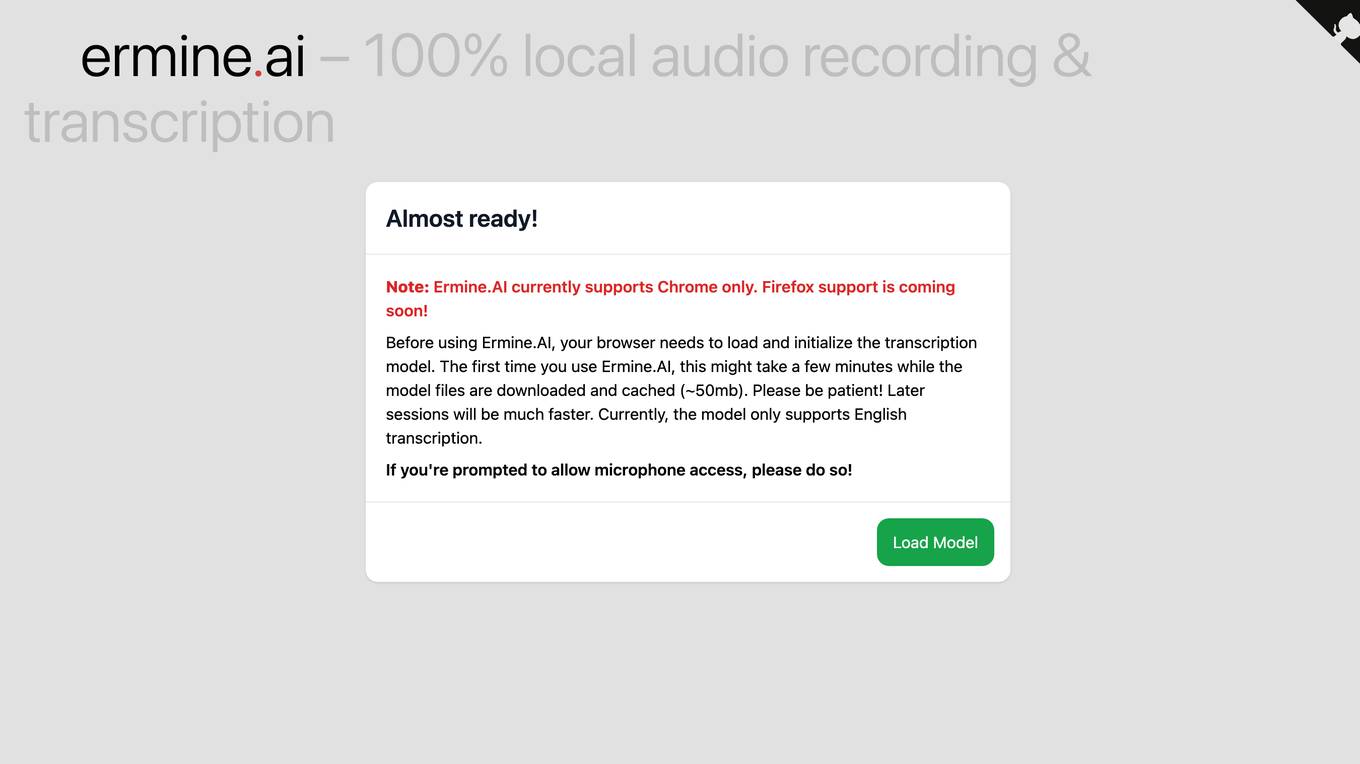
Ermine.ai
Ermine.ai is an AI-powered tool for local audio recording and transcription. It allows users to transcribe audio files in real-time using a transcription model that is loaded and initialized in the user's browser. The tool currently supports English transcription and requires Chrome browser for usage. Ermine.ai aims to provide a seamless and efficient transcription experience for users, with the promise of faster sessions in subsequent uses.
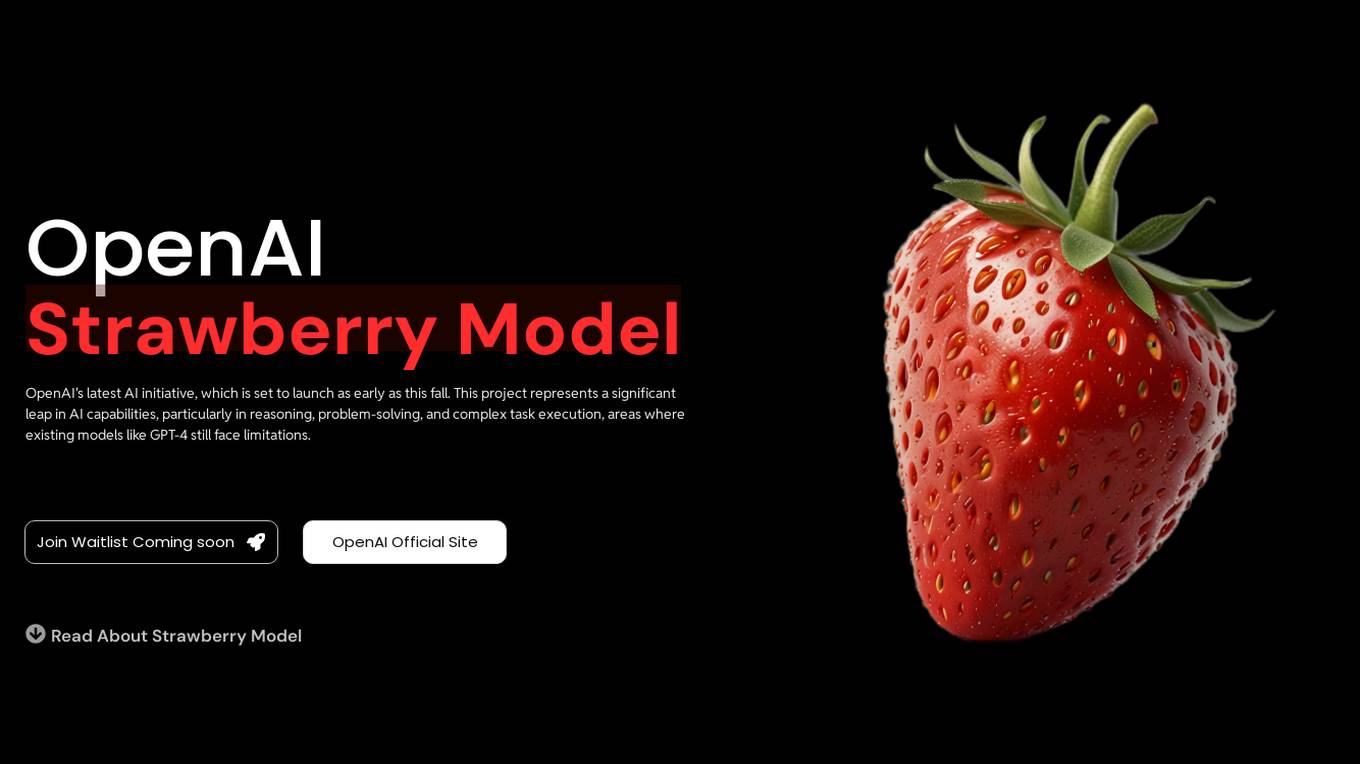
OpenAI Strawberry Model
OpenAI Strawberry Model is a cutting-edge AI initiative that represents a significant leap in AI capabilities, focusing on enhancing reasoning, problem-solving, and complex task execution. It aims to improve AI's ability to handle mathematical problems, programming tasks, and deep research, including long-term planning and action. The project showcases advancements in AI safety and aims to reduce errors in AI responses by generating high-quality synthetic data for training future models. Strawberry is designed to achieve human-like reasoning and is expected to play a crucial role in the development of OpenAI's next major model, codenamed 'Orion.'
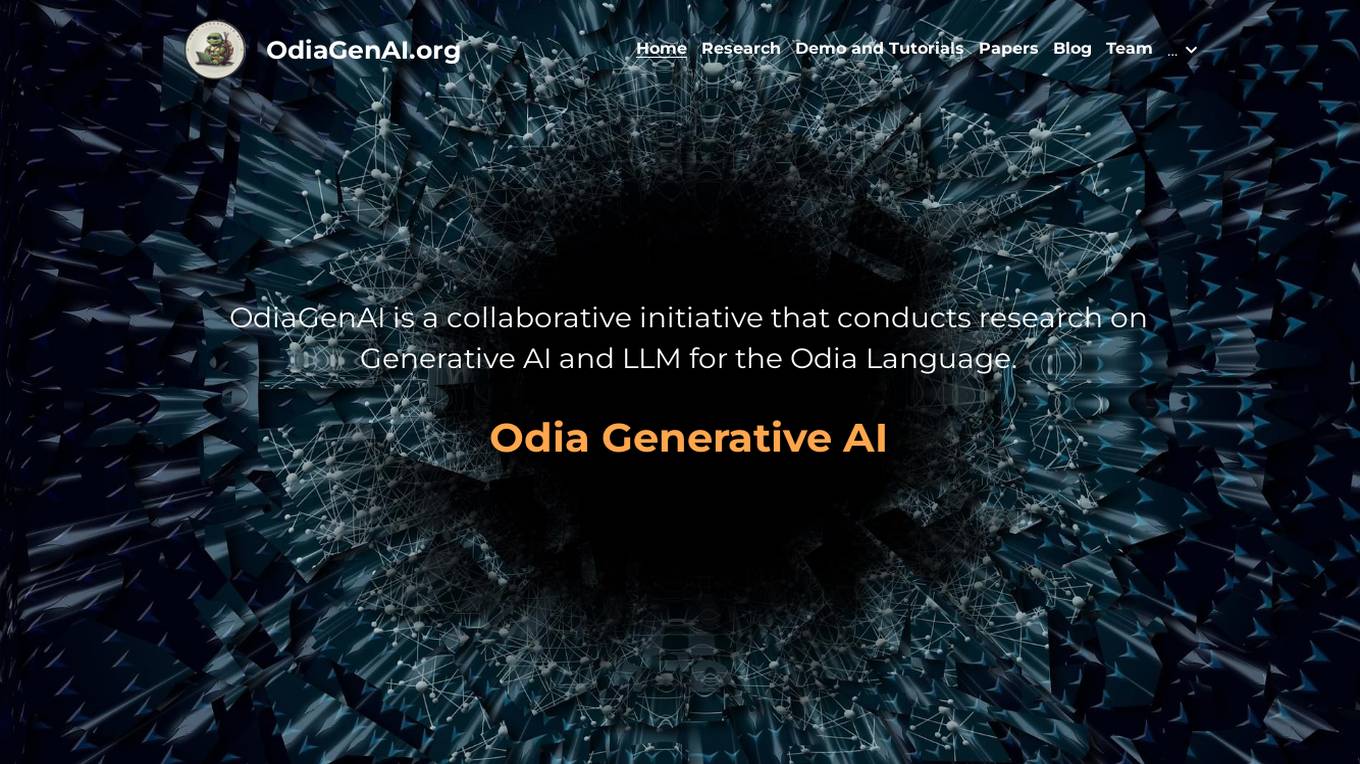
OdiaGenAI
OdiaGenAI is a collaborative initiative focused on conducting research on Generative AI and Large Language Models (LLM) for the Odia Language. The project aims to leverage AI technology to develop Generative AI and LLM-based solutions for the overall development of Odisha and the Odia language through collaboration among Odia technologists. The initiative offers pre-trained models, codes, and datasets for non-commercial and research purposes, with a focus on building language models for Indic languages like Odia and Bengali.
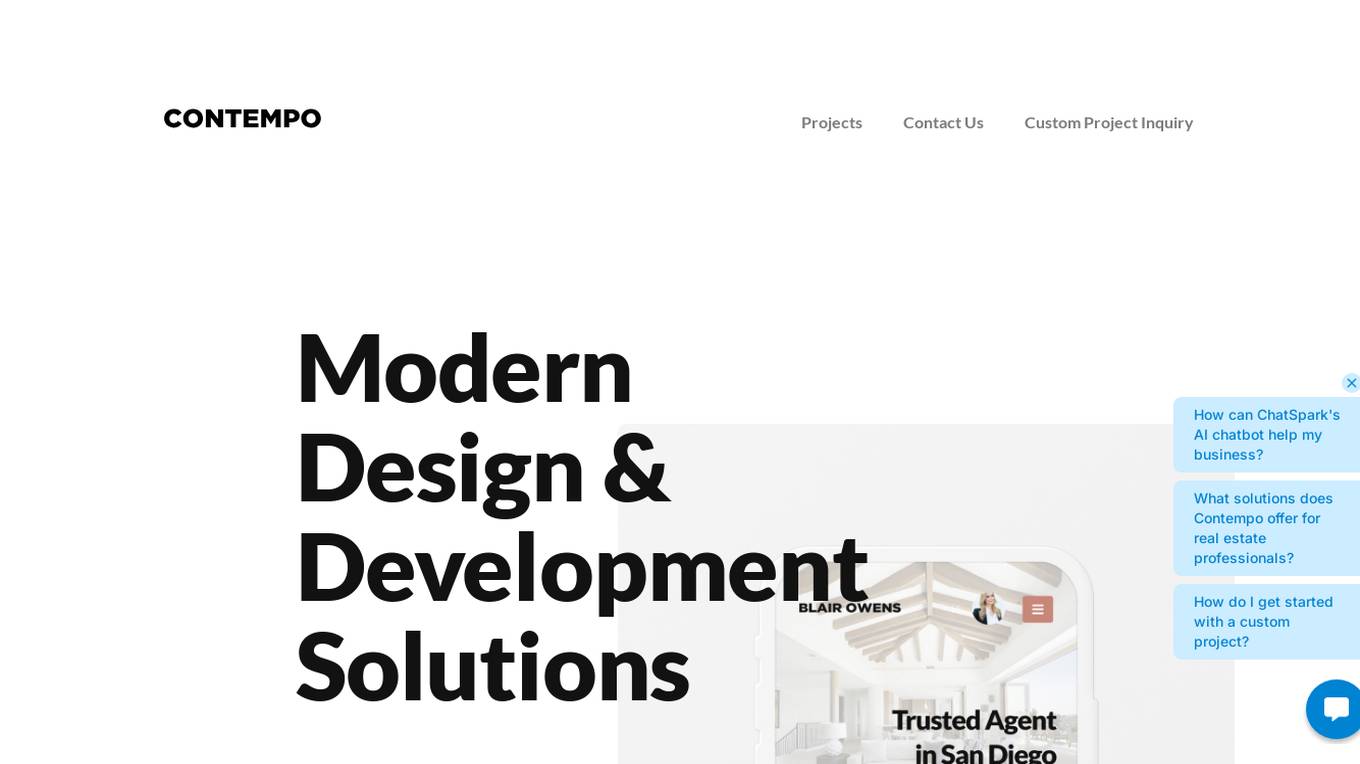
Contempo Creative Inc.
Contempo Creative Inc. is a technology company based in San Diego, California, specializing in modern design and development solutions. They offer industry-leading IDX websites for real estate professionals, powered by their own CRM & IDX technology. Their flagship AI initiative, ChatSpark, provides AI chatbots trained on unique data for personalized customer engagement. Contempo Themes focuses on delivering comprehensive and responsive IDX websites to empower real estate agents and brokers with cutting-edge tools and services. The company's mission is to make sophisticated, industry-leading solutions accessible and beneficial by combining AI capabilities with real estate expertise.
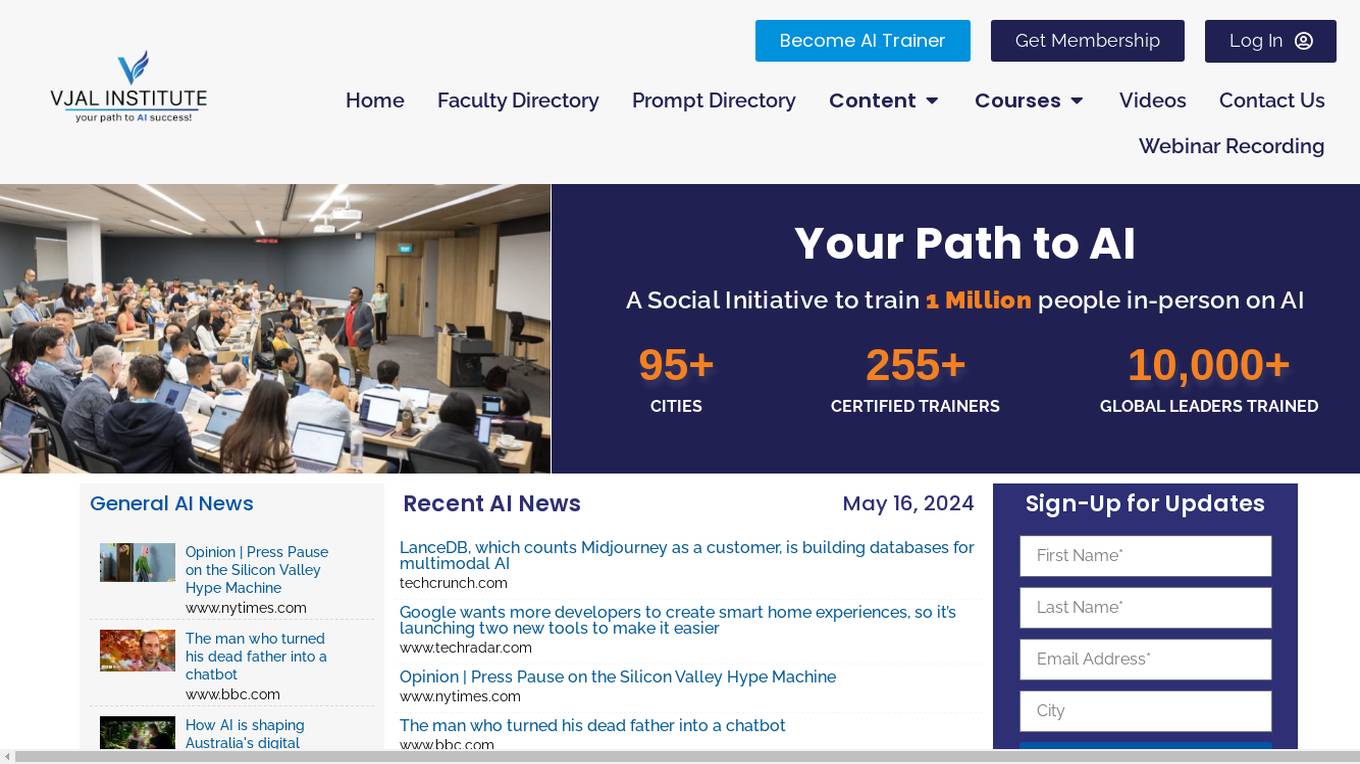
VJAL Institute
VJAL Institute is an AI training platform that aims to empower individuals and organizations with the knowledge and skills needed to thrive in the field of artificial intelligence. Through a variety of courses, workshops, and online resources, VJAL Institute provides comprehensive training on AI technologies, applications, and best practices. The platform also offers opportunities for networking, collaboration, and certification, making it a valuable resource for anyone looking to enhance their AI expertise.
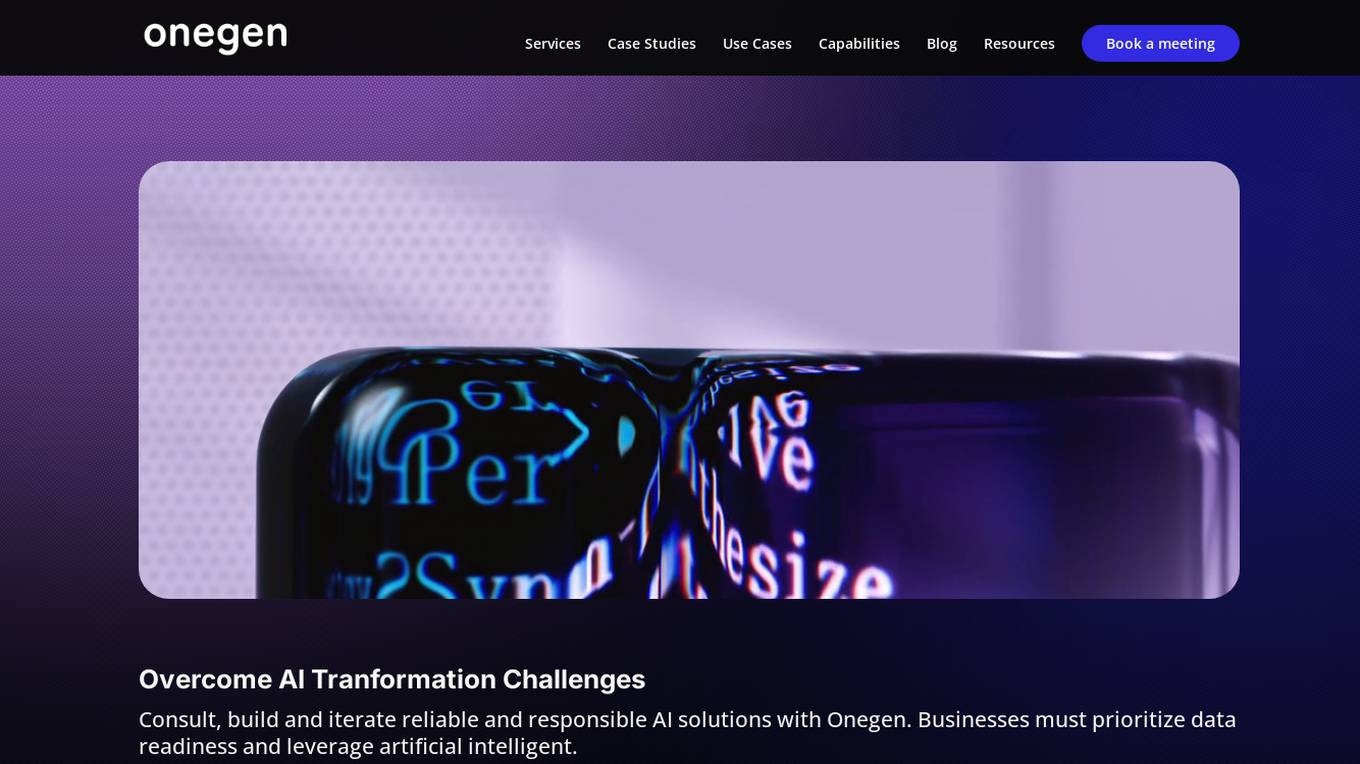
Onegen
Onegen is an AI application that provides end-to-end AI transformation services for startups and enterprises. The platform helps businesses consult, build, and iterate reliable and responsible AI solutions to overcome AI transformation challenges. Onegen emphasizes the importance of data readiness and leveraging artificial intelligence to drive success in various sectors such as retail, manufacturing, and technology startups. The platform offers AI insights for lead time management, legal operations enhancement, and rapid development of AI applications. With features like custom AI application development, AI integration services, LLM training and deployment, generative AI solutions, and predictive analytics, Onegen aims to empower businesses with scalable and expert-guided AI solutions.

AIToolBox
AIToolBox is an initiative that provides advanced AI tools for image and content generation, customization, and hosting solutions. Its mission is to empower businesses with cutting-edge AI capabilities.
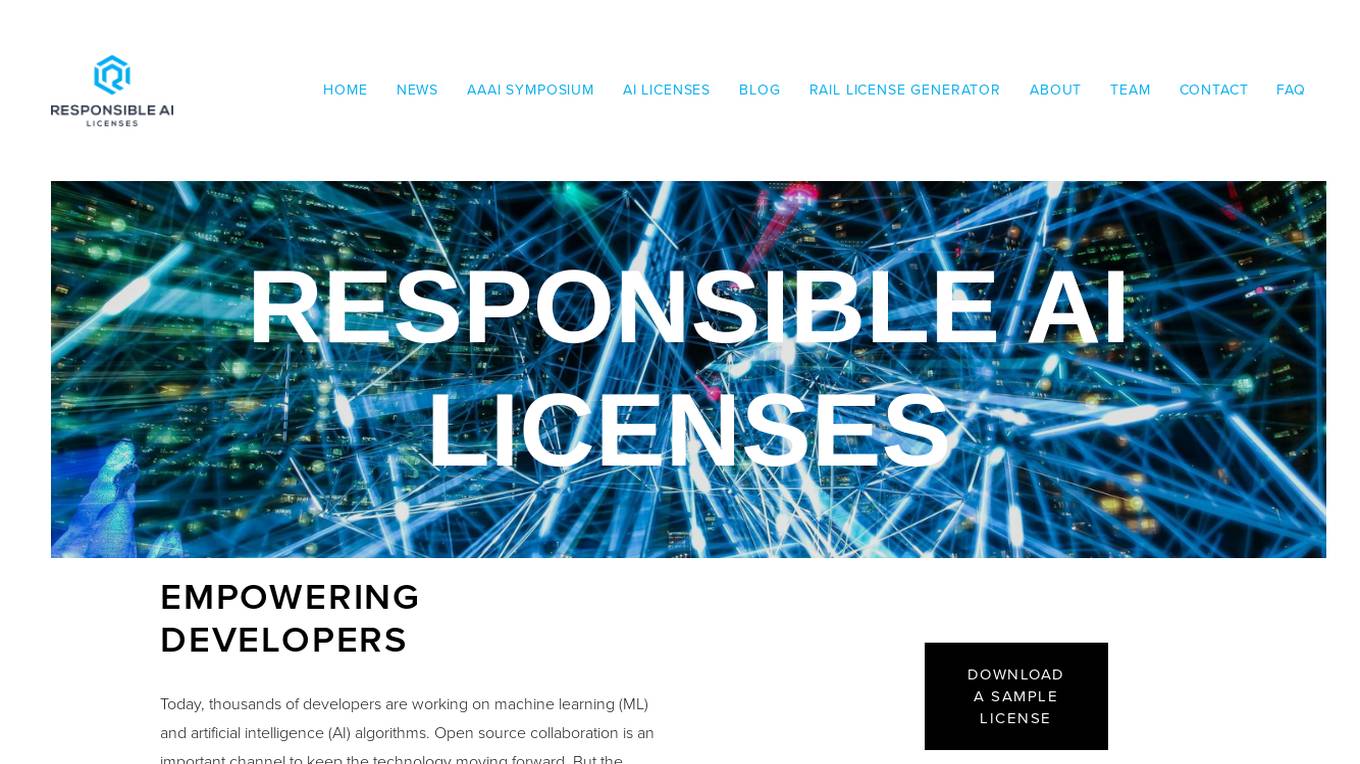
Responsible AI Licenses (RAIL)
Responsible AI Licenses (RAIL) is an initiative that empowers developers to restrict the use of their AI technology to prevent irresponsible and harmful applications. They provide licenses with behavioral-use clauses to control specific use-cases and prevent misuse of AI artifacts. The organization aims to standardize RAIL Licenses, develop collaboration tools, and educate developers on responsible AI practices.
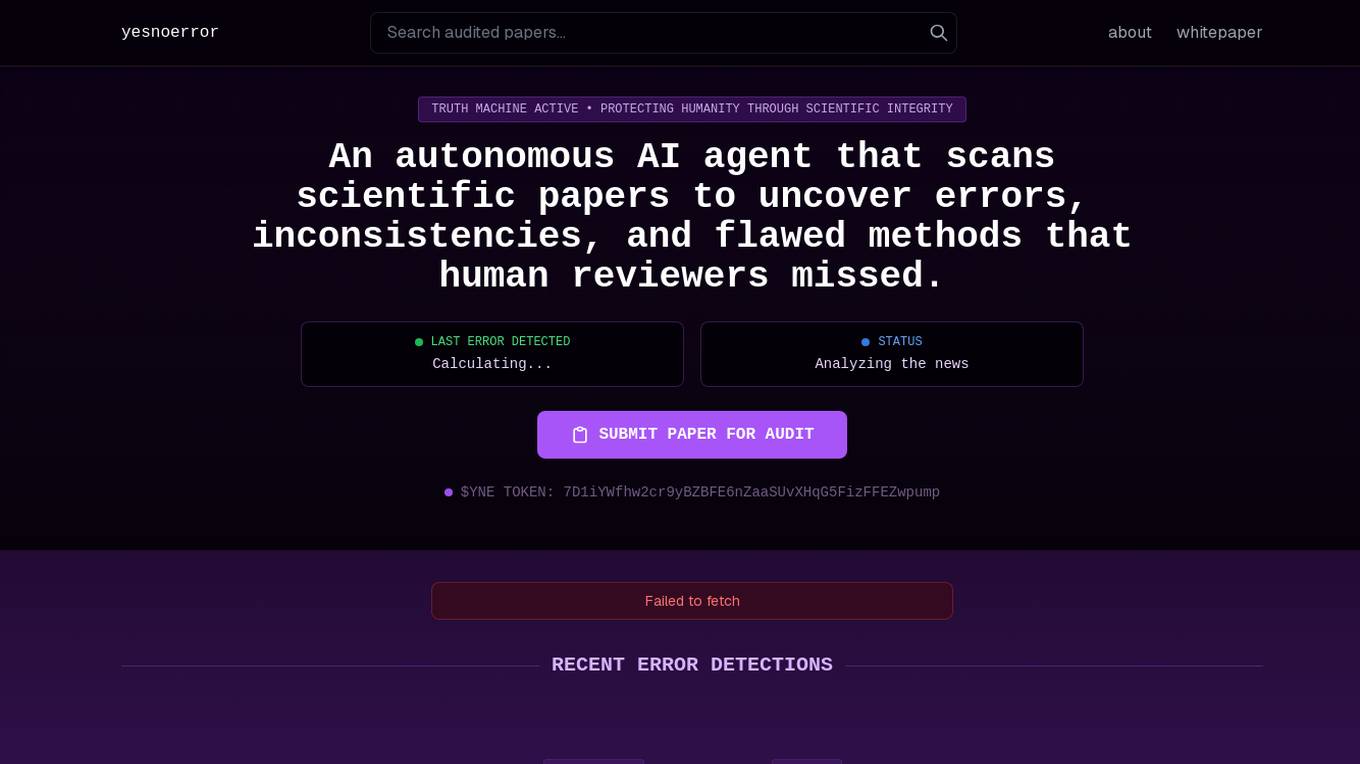
yesnoerror
yesnoerror is an autonomous AI agent developed by DeSci initiative that scans scientific papers to uncover errors, inconsistencies, and flawed methods that human reviewers may have missed. The tool utilizes blockchain technology and AI to audit science at scale, aiming to enhance scientific integrity through automated error detection. By analyzing papers from renowned repositories like arXiv, bioRxiv, and medRxiv, yesnoerror helps researchers identify and correct critical issues in research, such as mathematical errors and data discrepancies.
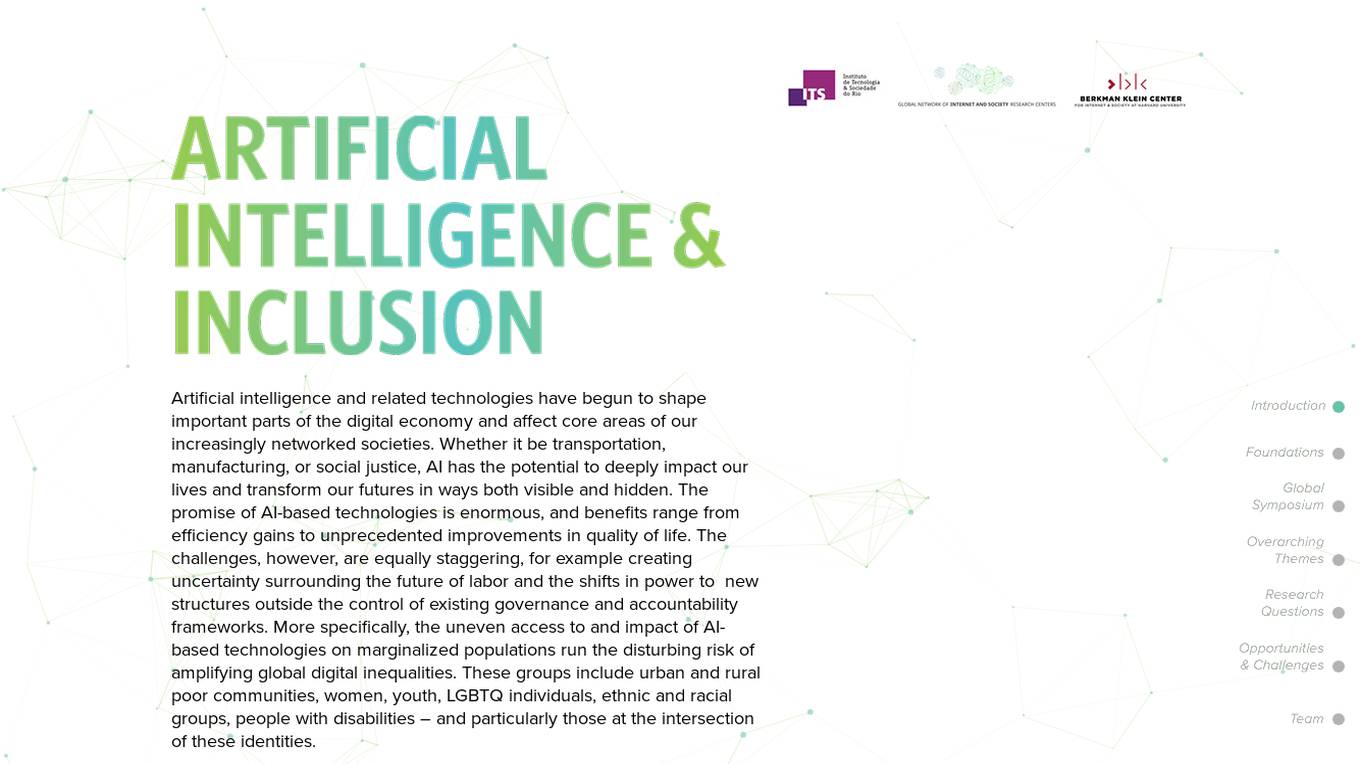
AI & Inclusion Hub
The website focuses on the intersection of artificial intelligence (AI) and inclusion, exploring the impact of AI technologies on marginalized populations and global digital inequalities. It provides resources, research findings, and ideas on themes like health, education, and humanitarian crisis mitigation. The site showcases the work of the Ethics and Governance of AI initiative in collaboration with the MIT Media Lab, incorporating perspectives from experts in the field. It aims to address challenges and opportunities related to AI and inclusion through research, events, and multi-stakeholder dialogues.
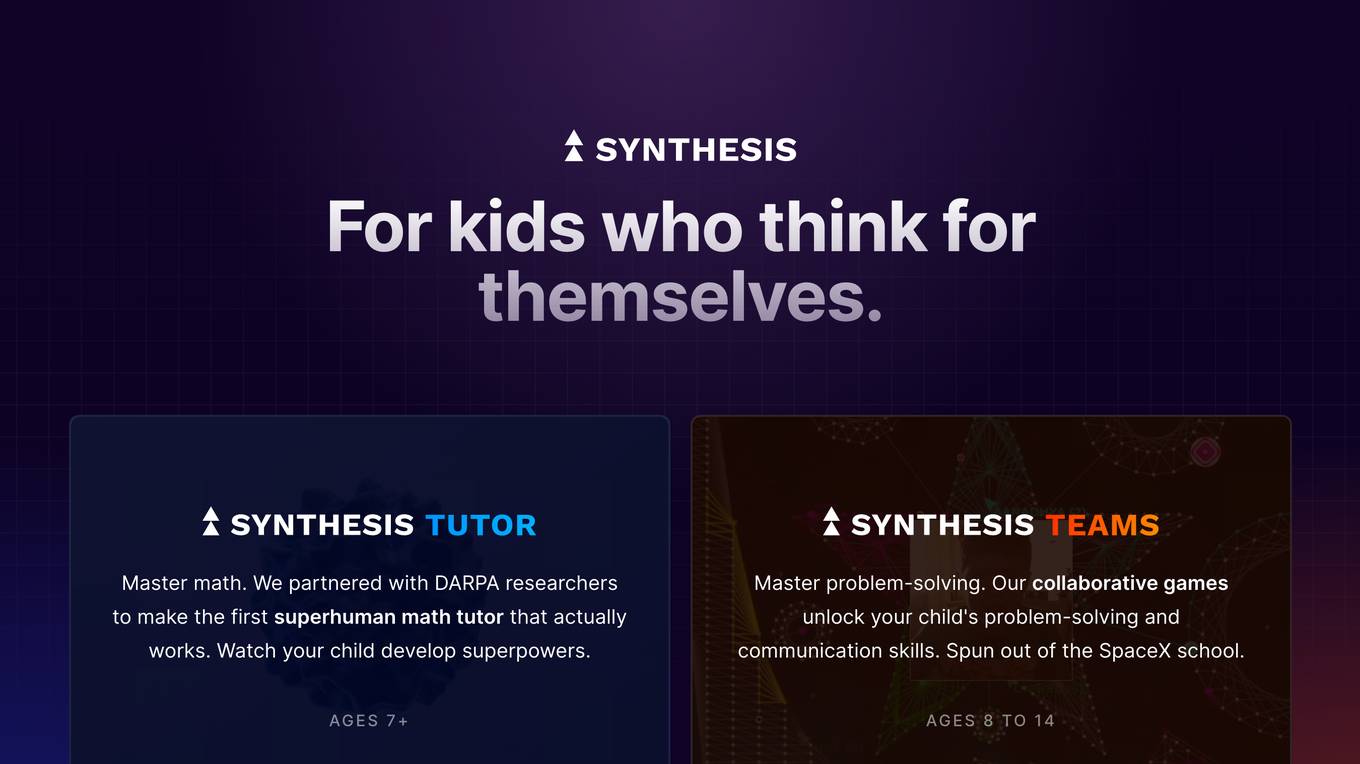
Synthesis
Synthesis is an innovative educational platform designed for kids who seek to think independently and excel in math and problem-solving. Developed in collaboration with DARPA researchers, it offers a superhuman math tutor and collaborative games to enhance children's problem-solving and communication skills. Founded as part of the SpaceX school initiative, Synthesis aims to cultivate student voice, strategic thinking, and collaborative problem-solving abilities. The platform provides unique learning experiences to a global community, empowering students to develop essential skills for the future.
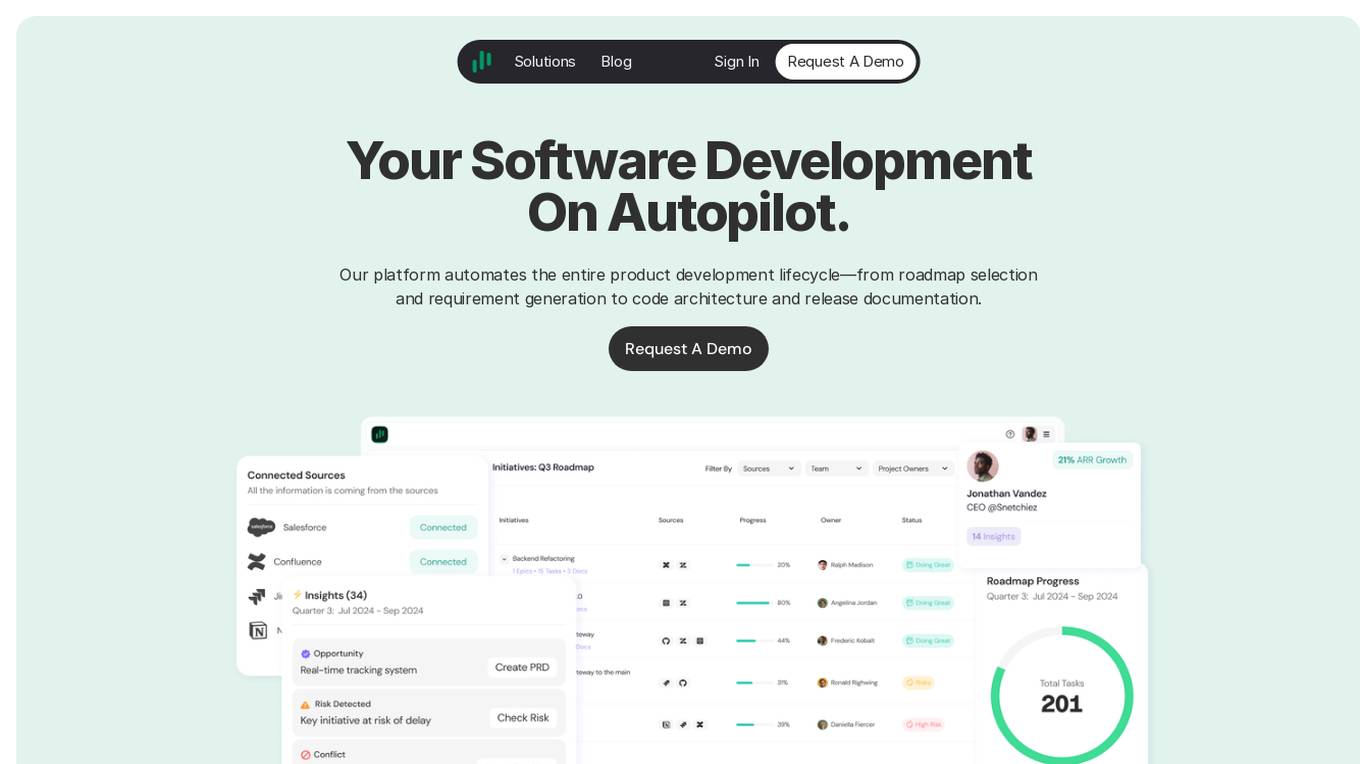
Prodmap AI
Prodmap AI is an AI-powered platform that automates the entire product development lifecycle, from roadmap selection and requirement generation to code architecture and release documentation. It helps streamline product development processes, save time, cut costs, and deliver impactful results. The platform offers features such as roadmap generation, faster roadmap planning, AI PRD generation, feature prioritization, real-time project monitoring, proactive risk management, end-to-end visibility, actionable execution insights, knowledge base, integrated tools, strategic initiative insights, custom AI agents, tailored automation, flexible AI solutions, and personalized workflows.
20 - Open Source AI Tools
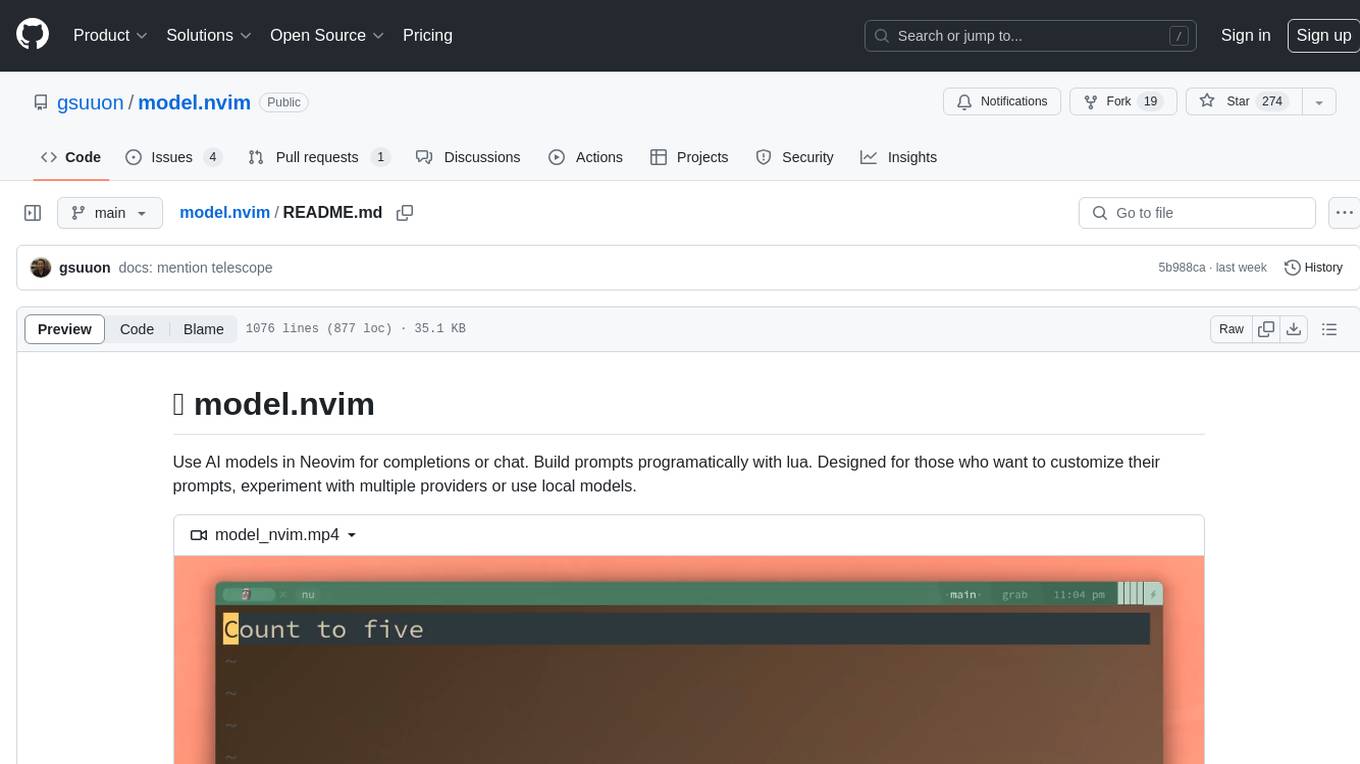
model.nvim
model.nvim is a tool designed for Neovim users who want to utilize AI models for completions or chat within their text editor. It allows users to build prompts programmatically with Lua, customize prompts, experiment with multiple providers, and use both hosted and local models. The tool supports features like provider agnosticism, programmatic prompts in Lua, async and multistep prompts, streaming completions, and chat functionality in 'mchat' filetype buffer. Users can customize prompts, manage responses, and context, and utilize various providers like OpenAI ChatGPT, Google PaLM, llama.cpp, ollama, and more. The tool also supports treesitter highlights and folds for chat buffers.
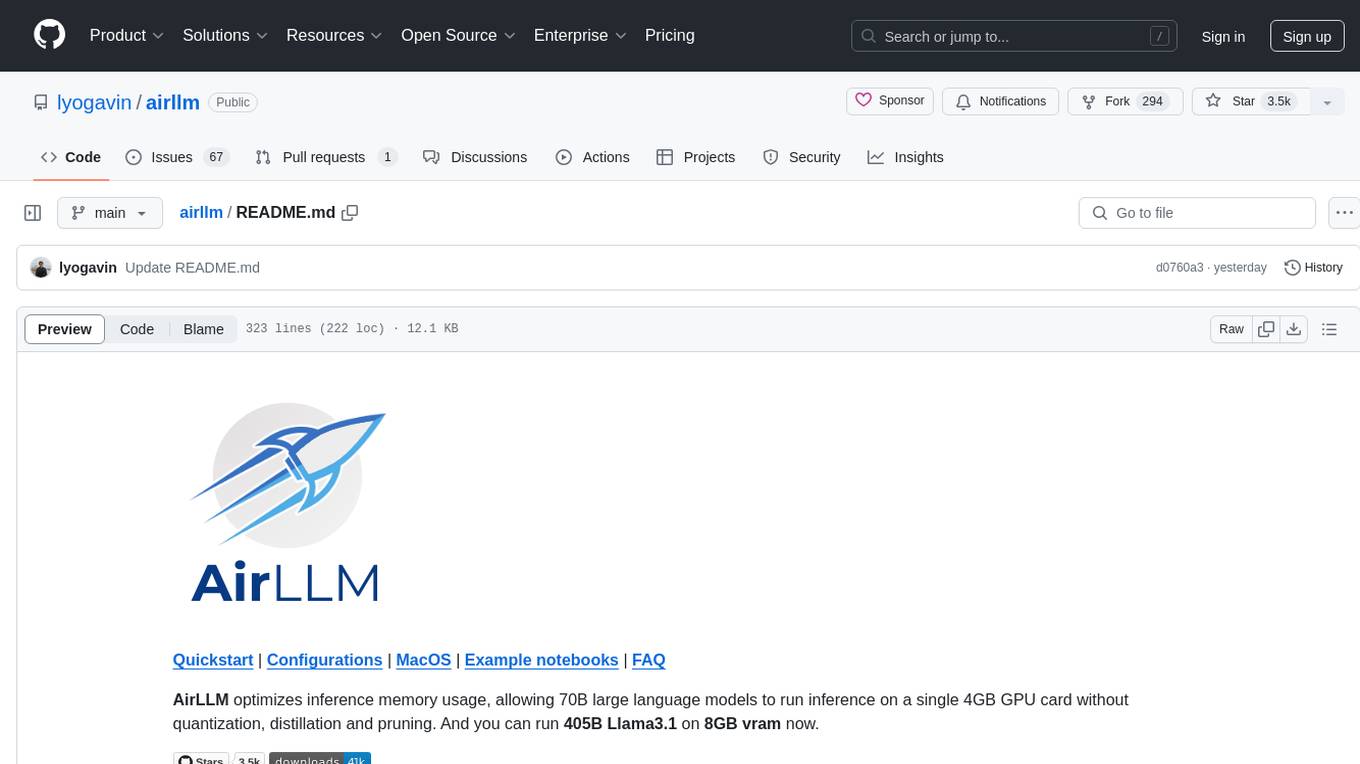
airllm
AirLLM is a tool that optimizes inference memory usage, enabling large language models to run on low-end GPUs without quantization, distillation, or pruning. It supports models like Llama3.1 on 8GB VRAM. The tool offers model compression for up to 3x inference speedup with minimal accuracy loss. Users can specify compression levels, profiling modes, and other configurations when initializing models. AirLLM also supports prefetching and disk space management. It provides examples and notebooks for easy implementation and usage.
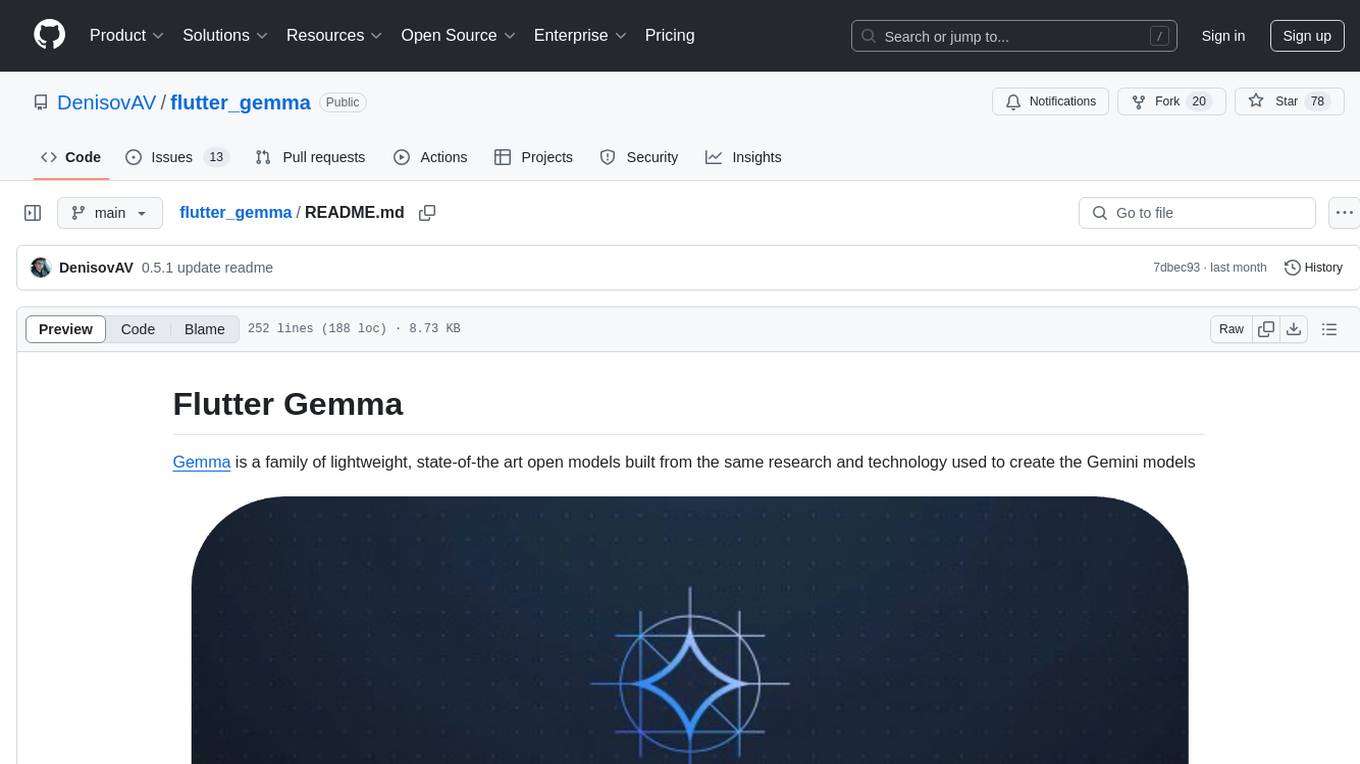
flutter_gemma
Flutter Gemma is a family of lightweight, state-of-the art open models that bring the power of Google's Gemma language models directly to Flutter applications. It allows for local execution on user devices, supports both iOS and Android platforms, and offers LoRA support for tailored AI behavior. The tool provides a simple interface for integrating Gemma models into Flutter projects, enabling advanced AI capabilities without relying on external servers. Users can easily download pre-trained Gemma models, fine-tune them for specific use cases, and customize behavior using LoRA weights. The tool supports model and LoRA weight management, model initialization, response generation, and chat scenarios, with considerations for model size, LoRA weights, and production app deployment.
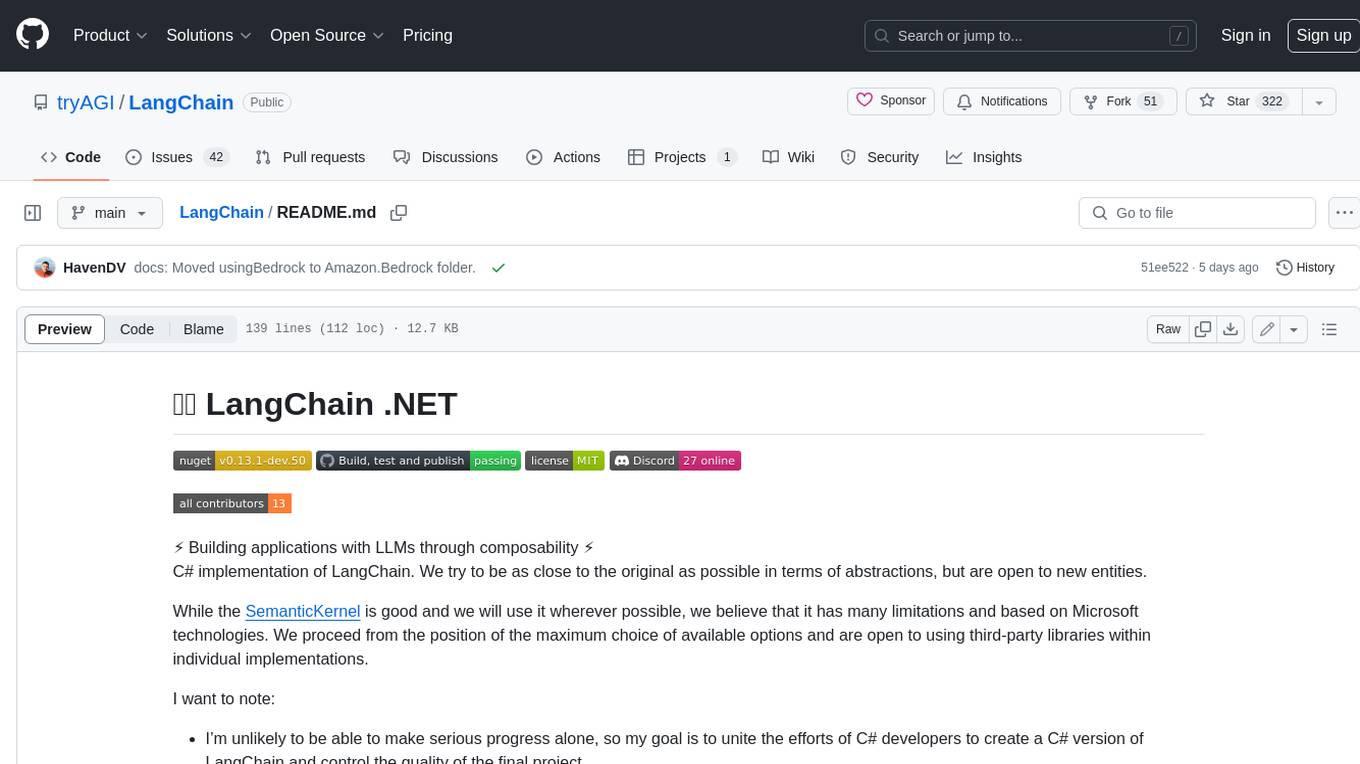
LangChain
LangChain is a C# implementation of the LangChain library, which provides a composable way to build applications with LLMs (Large Language Models). It offers a variety of features, including: - A unified interface for interacting with different LLMs, such as OpenAI's GPT-3 and Microsoft's Azure OpenAI Service - A set of pre-built chains that can be used to perform common tasks, such as question answering, summarization, and translation - A flexible API that allows developers to create their own custom chains - A growing community of developers and users who are contributing to the project LangChain is still under development, but it is already being used to build a variety of applications, including chatbots, search engines, and writing assistants. As the project continues to mature, it is expected to become an increasingly valuable tool for developers who want to build applications with LLMs.
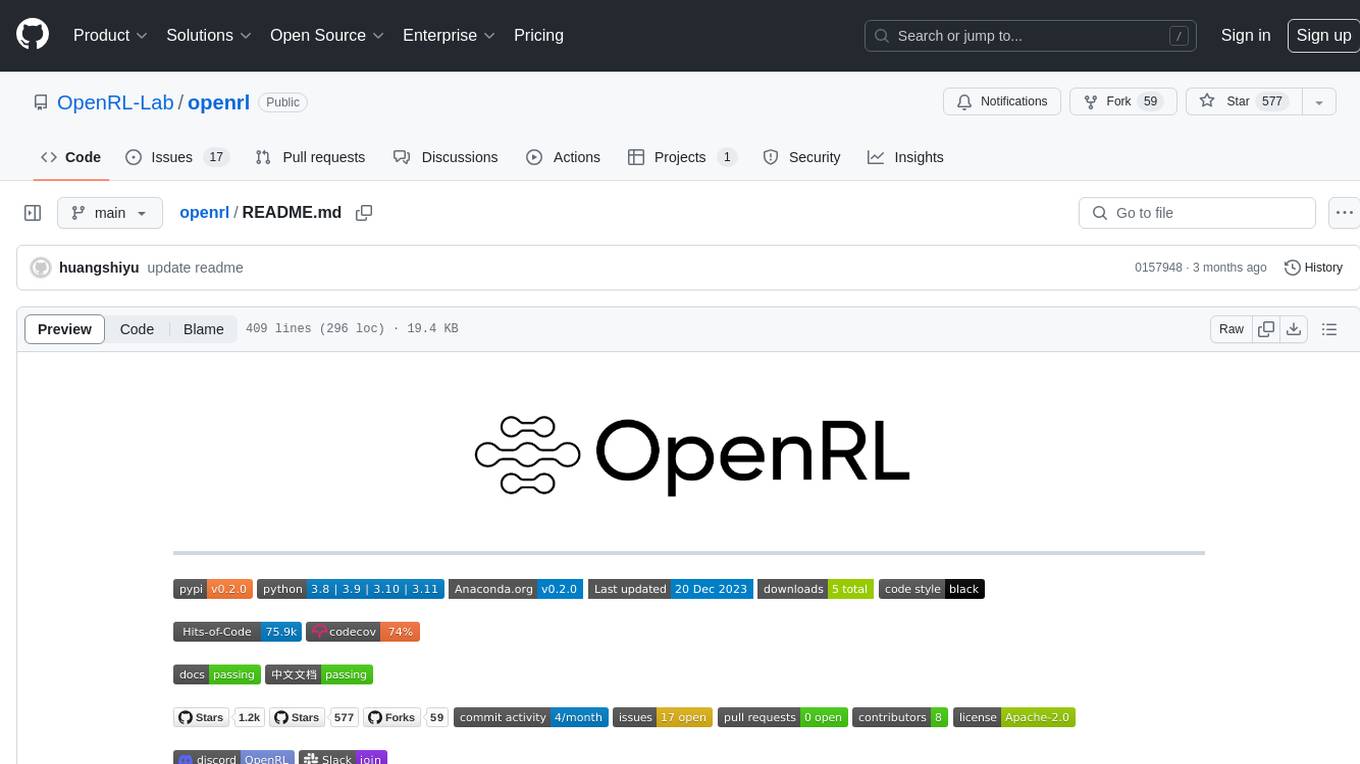
openrl
OpenRL is an open-source general reinforcement learning research framework that supports training for various tasks such as single-agent, multi-agent, offline RL, self-play, and natural language. Developed based on PyTorch, the goal of OpenRL is to provide a simple-to-use, flexible, efficient and sustainable platform for the reinforcement learning research community. It supports a universal interface for all tasks/environments, single-agent and multi-agent tasks, offline RL training with expert dataset, self-play training, reinforcement learning training for natural language tasks, DeepSpeed, Arena for evaluation, importing models and datasets from Hugging Face, user-defined environments, models, and datasets, gymnasium environments, callbacks, visualization tools, unit testing, and code coverage testing. It also supports various algorithms like PPO, DQN, SAC, and environments like Gymnasium, MuJoCo, Atari, and more.
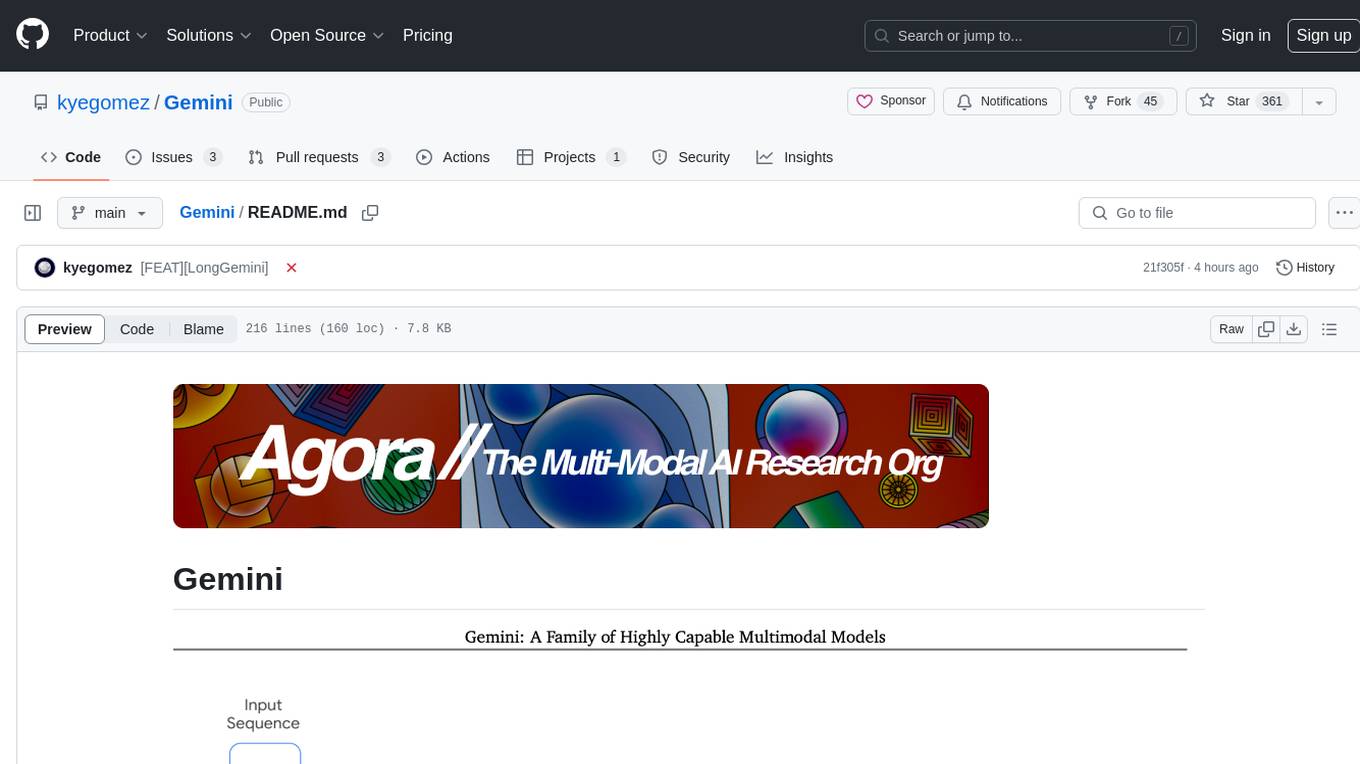
Gemini
Gemini is an open-source model designed to handle multiple modalities such as text, audio, images, and videos. It utilizes a transformer architecture with special decoders for text and image generation. The model processes input sequences by transforming them into tokens and then decoding them to generate image outputs. Gemini differs from other models by directly feeding image embeddings into the transformer instead of using a visual transformer encoder. The model also includes a component called Codi for conditional generation. Gemini aims to effectively integrate image, audio, and video embeddings to enhance its performance.
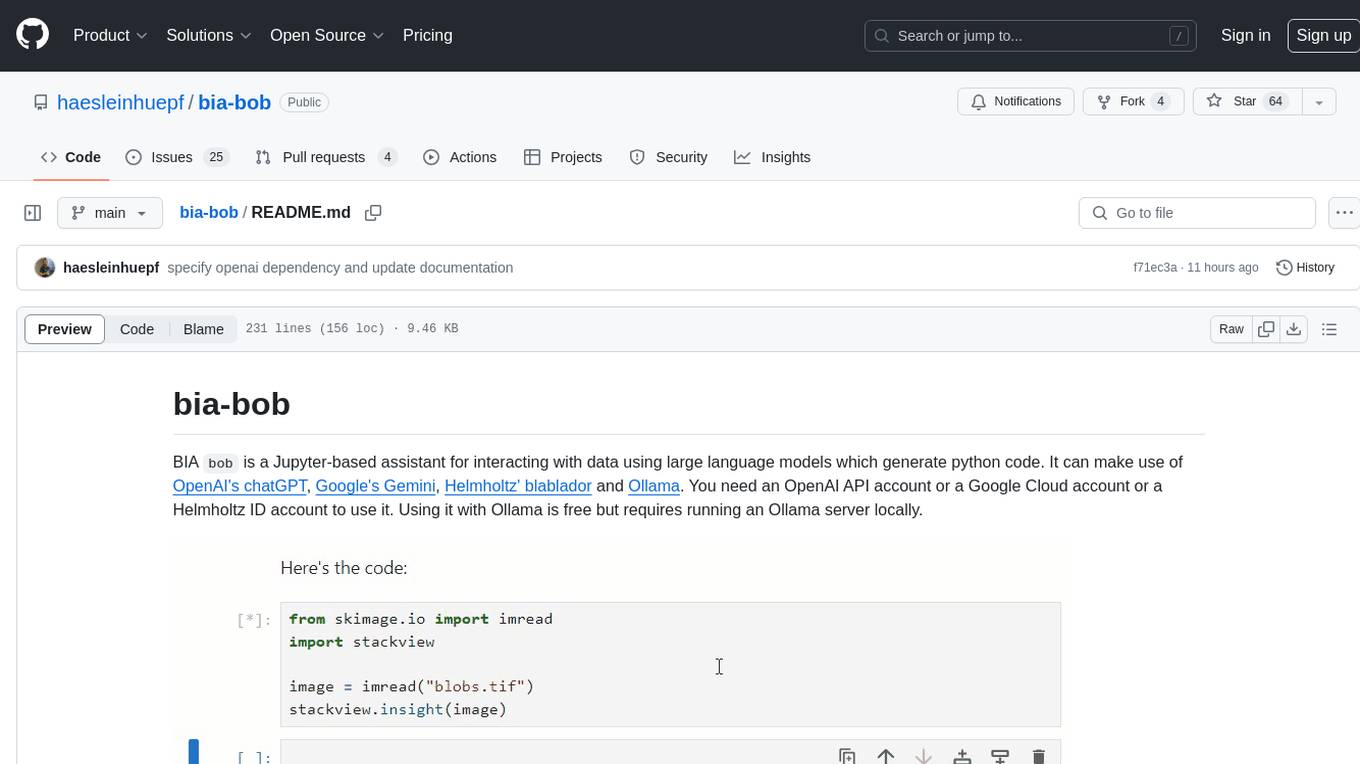
bia-bob
BIA `bob` is a Jupyter-based assistant for interacting with data using large language models to generate Python code. It can utilize OpenAI's chatGPT, Google's Gemini, Helmholtz' blablador, and Ollama. Users need respective accounts to access these services. Bob can assist in code generation, bug fixing, code documentation, GPU-acceleration, and offers a no-code custom Jupyter Kernel. It provides example notebooks for various tasks like bio-image analysis, model selection, and bug fixing. Installation is recommended via conda/mamba environment. Custom endpoints like blablador and ollama can be used. Google Cloud AI API integration is also supported. The tool is extensible for Python libraries to enhance Bob's functionality.

deeppowers
Deeppowers is a powerful Python library for deep learning applications. It provides a wide range of tools and utilities to simplify the process of building and training deep neural networks. With Deeppowers, users can easily create complex neural network architectures, perform efficient training and optimization, and deploy models for various tasks. The library is designed to be user-friendly and flexible, making it suitable for both beginners and experienced deep learning practitioners.
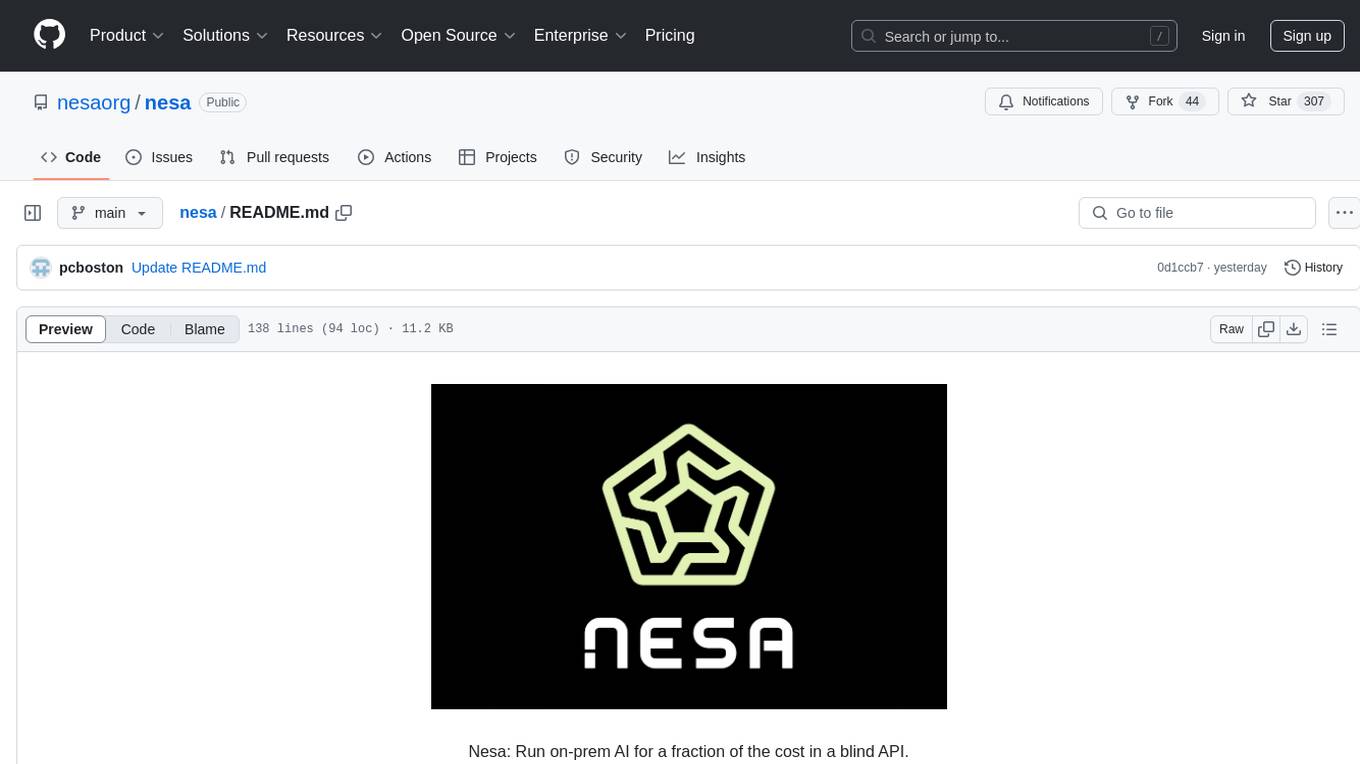
nesa
Nesa is a tool that allows users to run on-prem AI for a fraction of the cost through a blind API. It provides blind privacy, zero latency on protected inference, wide model coverage, cost savings compared to cloud and on-prem AI, RAG support, and ChatGPT compatibility. Nesa achieves blind AI through Equivariant Encryption (EE), a new security technology that provides complete inference encryption with no additional latency. EE allows users to perform inference on neural networks without exposing the underlying data, preserving data privacy and security.
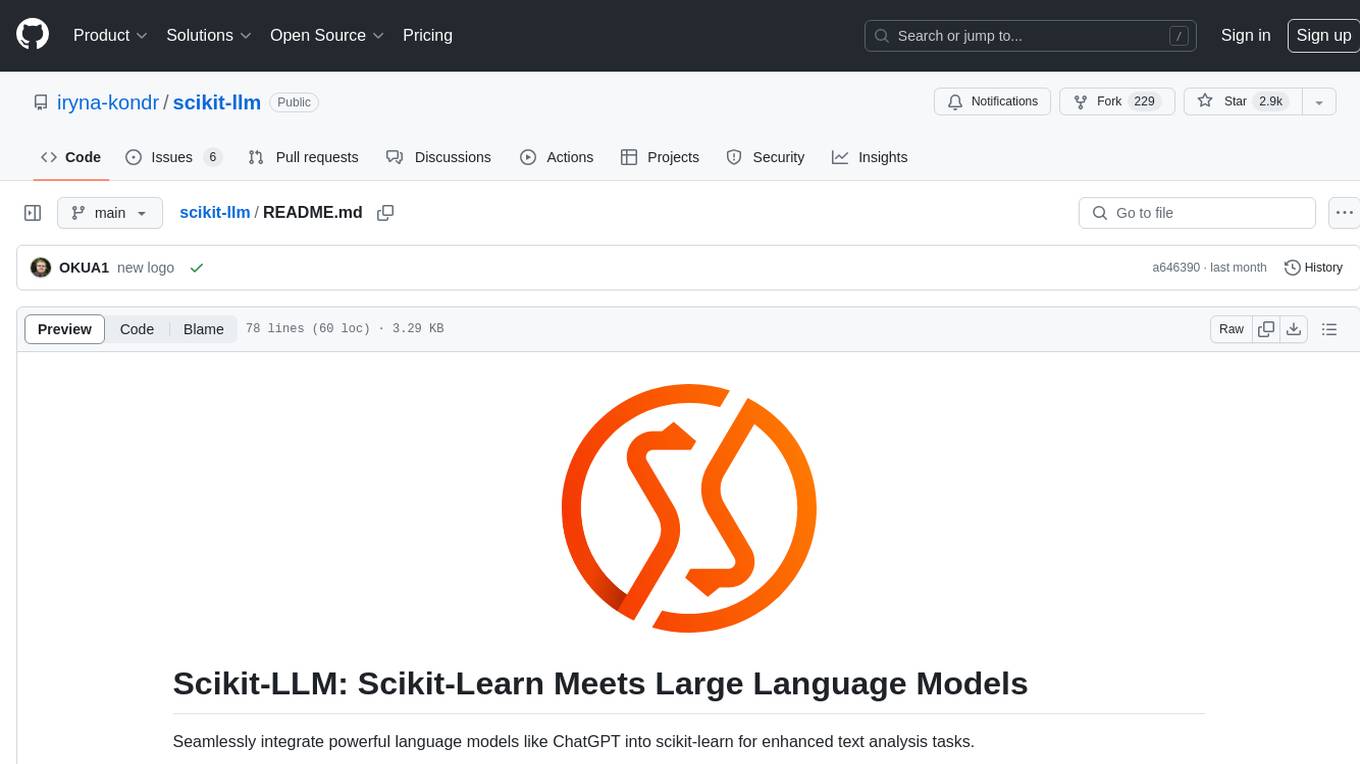
scikit-llm
Scikit-LLM is a tool that seamlessly integrates powerful language models like ChatGPT into scikit-learn for enhanced text analysis tasks. It allows users to leverage large language models for various text analysis applications within the familiar scikit-learn framework. The tool simplifies the process of incorporating advanced language processing capabilities into machine learning pipelines, enabling users to benefit from the latest advancements in natural language processing.
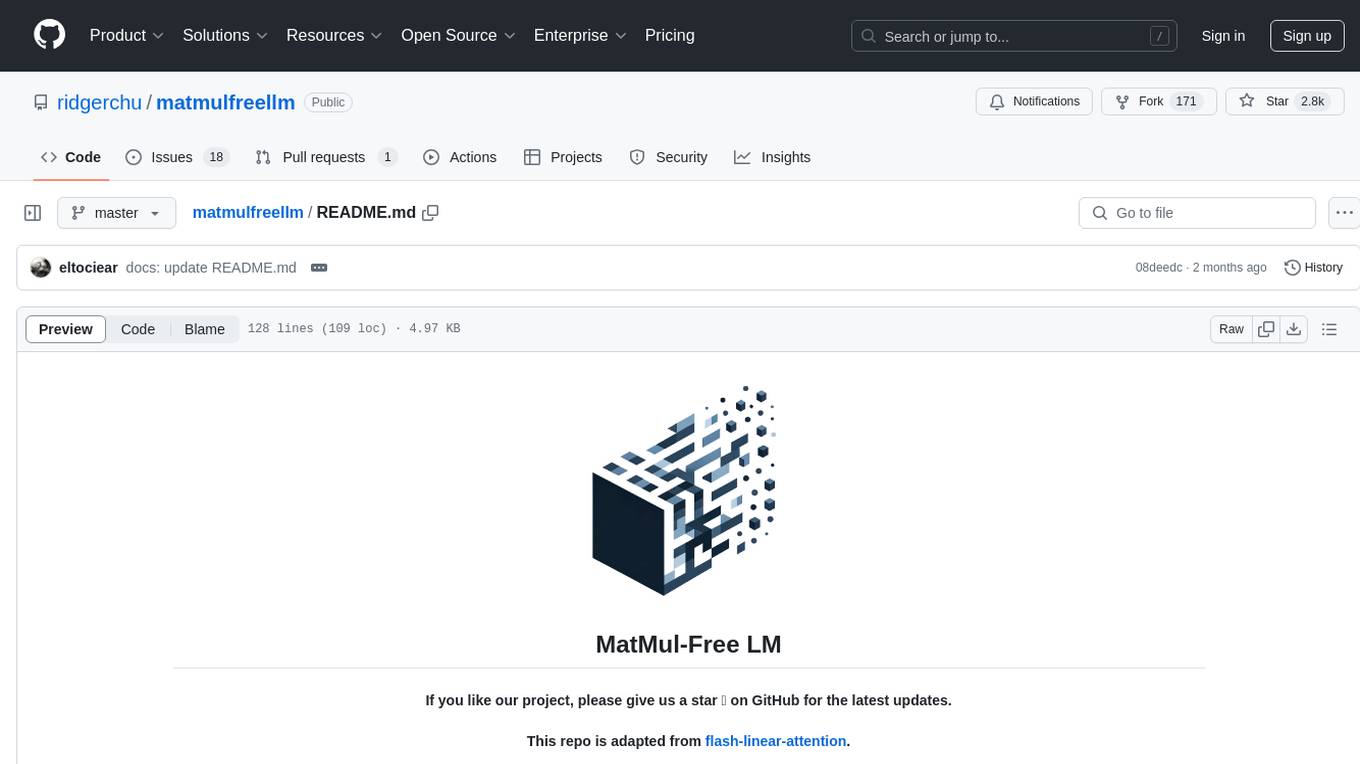
matmulfreellm
MatMul-Free LM is a language model architecture that eliminates the need for Matrix Multiplication (MatMul) operations. This repository provides an implementation of MatMul-Free LM that is compatible with the 🤗 Transformers library. It evaluates how the scaling law fits to different parameter models and compares the efficiency of the architecture in leveraging additional compute to improve performance. The repo includes pre-trained models, model implementations compatible with 🤗 Transformers library, and generation examples for text using the 🤗 text generation APIs.
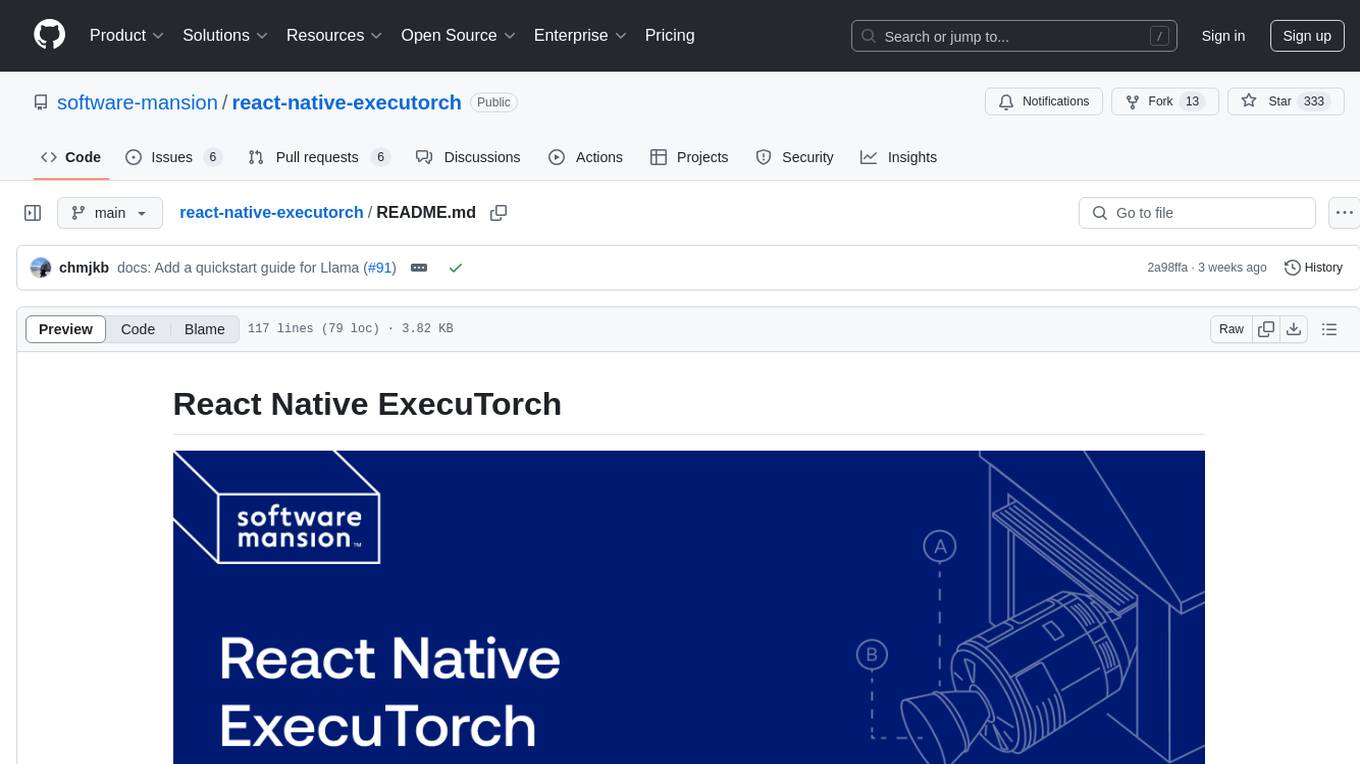
react-native-executorch
React Native ExecuTorch is a framework that allows developers to run AI models on mobile devices using React Native. It bridges the gap between React Native and native platform capabilities, providing high-performance AI model execution without requiring deep knowledge of native code or machine learning internals. The tool supports ready-made models in `.pte` format and offers a Python API for custom models. It is designed to simplify the integration of AI features into React Native apps.

mosec
Mosec is a high-performance and flexible model serving framework for building ML model-enabled backend and microservices. It bridges the gap between any machine learning models you just trained and the efficient online service API. * **Highly performant** : web layer and task coordination built with Rust 🦀, which offers blazing speed in addition to efficient CPU utilization powered by async I/O * **Ease of use** : user interface purely in Python 🐍, by which users can serve their models in an ML framework-agnostic manner using the same code as they do for offline testing * **Dynamic batching** : aggregate requests from different users for batched inference and distribute results back * **Pipelined stages** : spawn multiple processes for pipelined stages to handle CPU/GPU/IO mixed workloads * **Cloud friendly** : designed to run in the cloud, with the model warmup, graceful shutdown, and Prometheus monitoring metrics, easily managed by Kubernetes or any container orchestration systems * **Do one thing well** : focus on the online serving part, users can pay attention to the model optimization and business logic
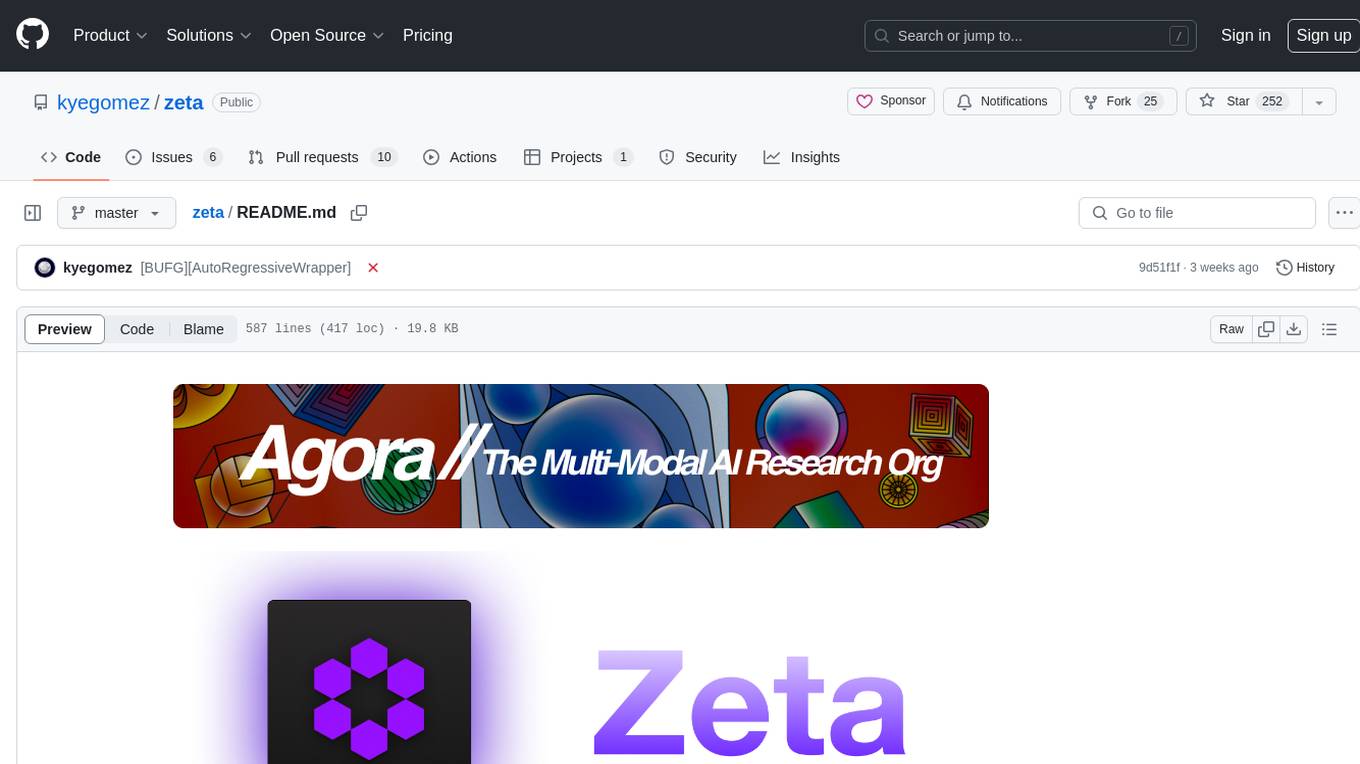
zeta
Zeta is a tool designed to build state-of-the-art AI models faster by providing modular, high-performance, and scalable building blocks. It addresses the common issues faced while working with neural nets, such as chaotic codebases, lack of modularity, and low performance modules. Zeta emphasizes usability, modularity, and performance, and is currently used in hundreds of models across various GitHub repositories. It enables users to prototype, train, optimize, and deploy the latest SOTA neural nets into production. The tool offers various modules like FlashAttention, SwiGLUStacked, RelativePositionBias, FeedForward, BitLinear, PalmE, Unet, VisionEmbeddings, niva, FusedDenseGELUDense, FusedDropoutLayerNorm, MambaBlock, Film, hyper_optimize, DPO, and ZetaCloud for different tasks in AI model development.
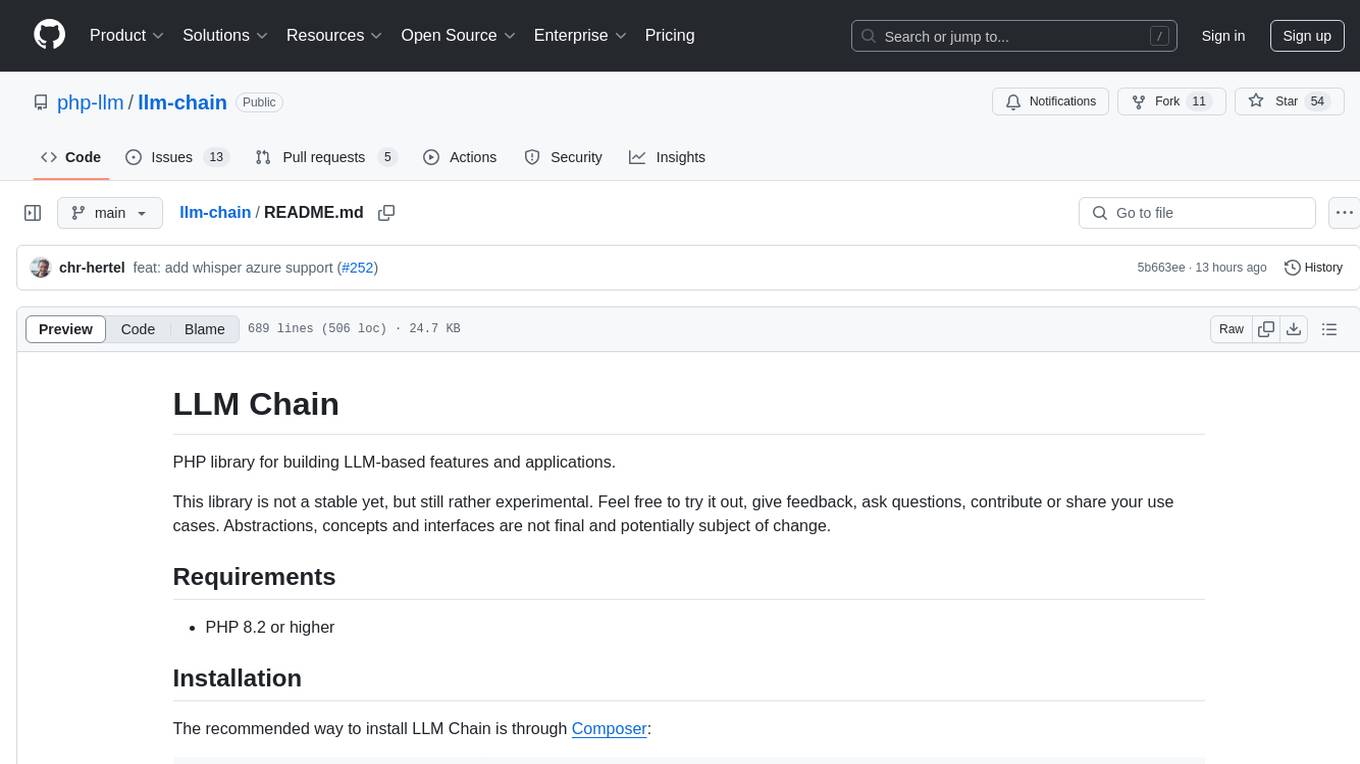
llm-chain
LLM Chain is a PHP library for building LLM-based features and applications. It provides abstractions for Language Models and Embeddings Models from platforms like OpenAI, Azure, Google, Replicate, and others. The core feature is to interact with language models via messages, supporting different message types and content. LLM Chain also supports tool calling, document embedding, vector stores, similarity search, structured output, response streaming, image processing, audio processing, embeddings, parallel platform calls, and input/output processing. Contributions are welcome, and the repository contains fixture licenses for testing multi-modal features.
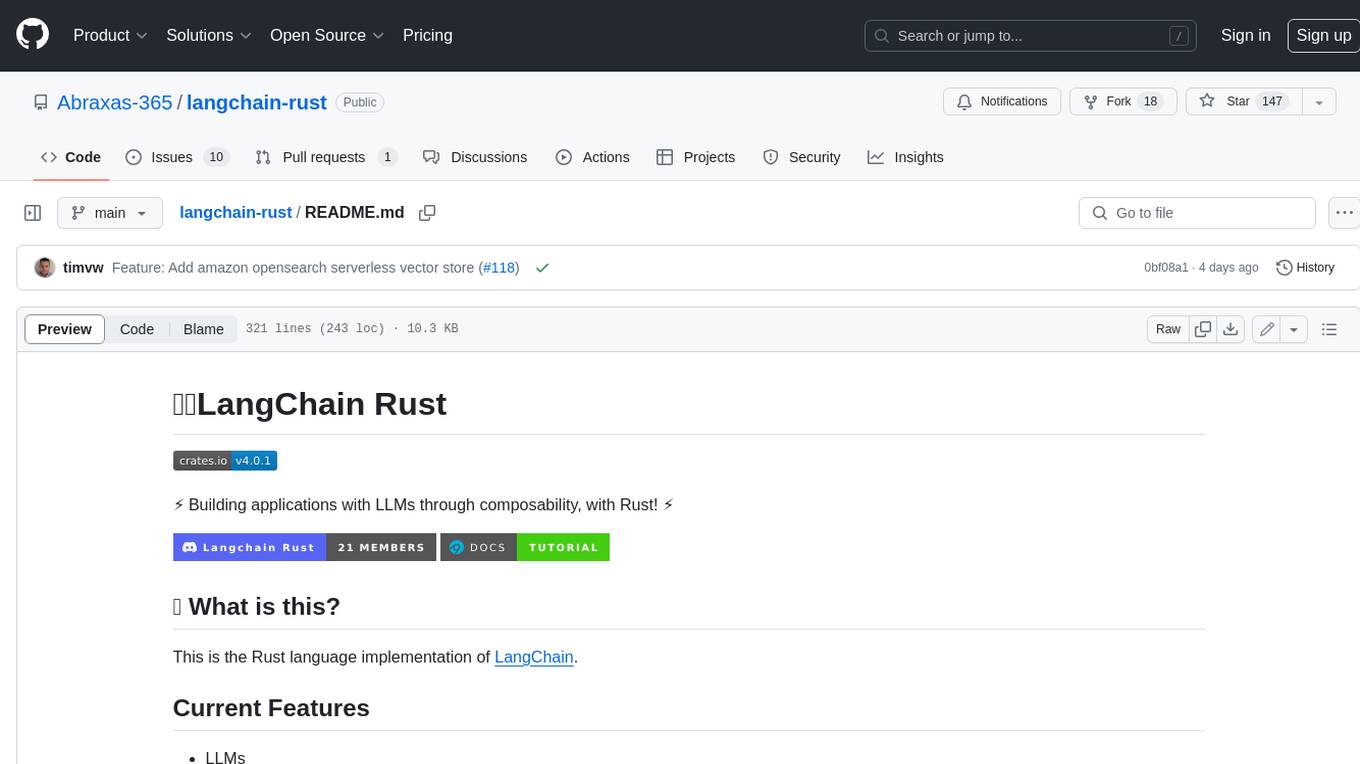
langchain-rust
LangChain Rust is a library for building applications with Large Language Models (LLMs) through composability. It provides a set of tools and components that can be used to create conversational agents, document loaders, and other applications that leverage LLMs. LangChain Rust supports a variety of LLMs, including OpenAI, Azure OpenAI, Ollama, and Anthropic Claude. It also supports a variety of embeddings, vector stores, and document loaders. LangChain Rust is designed to be easy to use and extensible, making it a great choice for developers who want to build applications with LLMs.
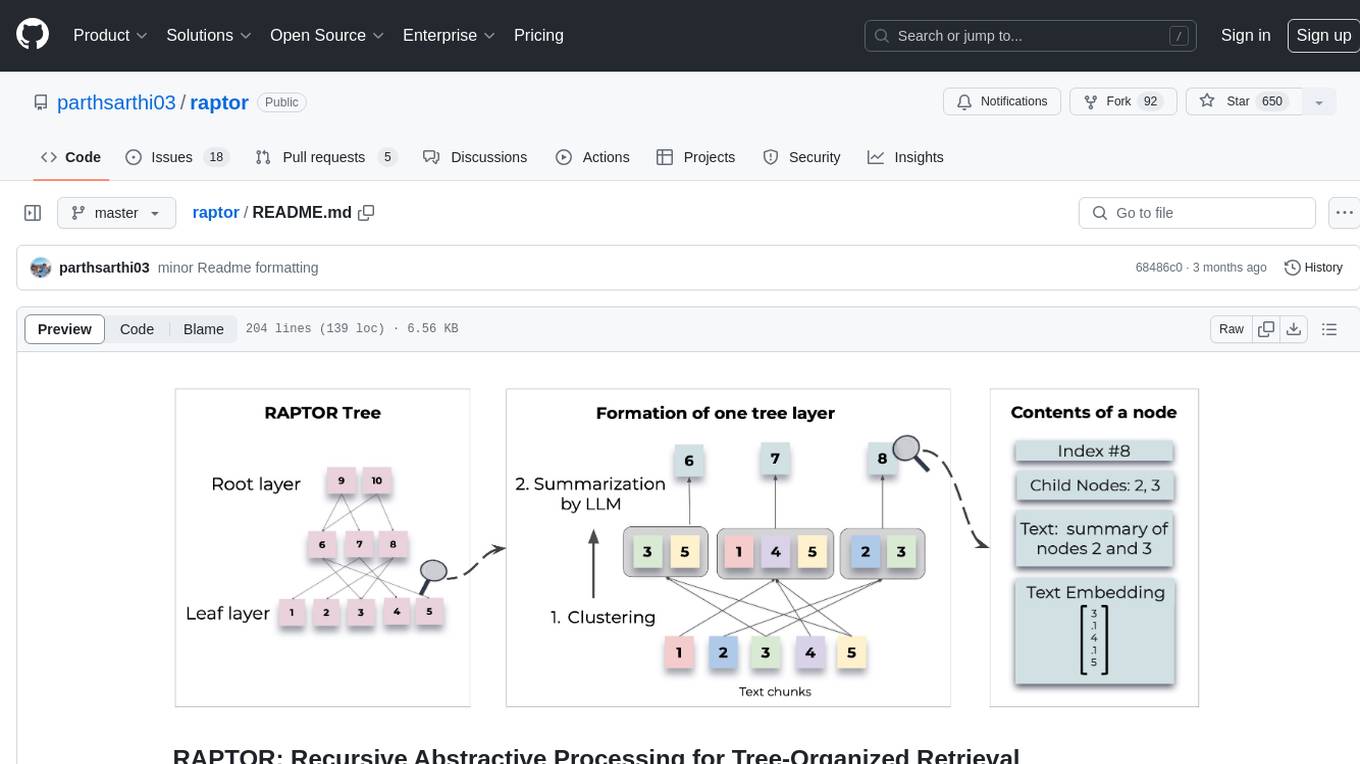
raptor
RAPTOR introduces a novel approach to retrieval-augmented language models by constructing a recursive tree structure from documents. This allows for more efficient and context-aware information retrieval across large texts, addressing common limitations in traditional language models. Users can add documents to the tree, answer questions based on indexed documents, save and load the tree, and extend RAPTOR with custom summarization, question-answering, and embedding models. The tool is designed to be flexible and customizable for various NLP tasks.
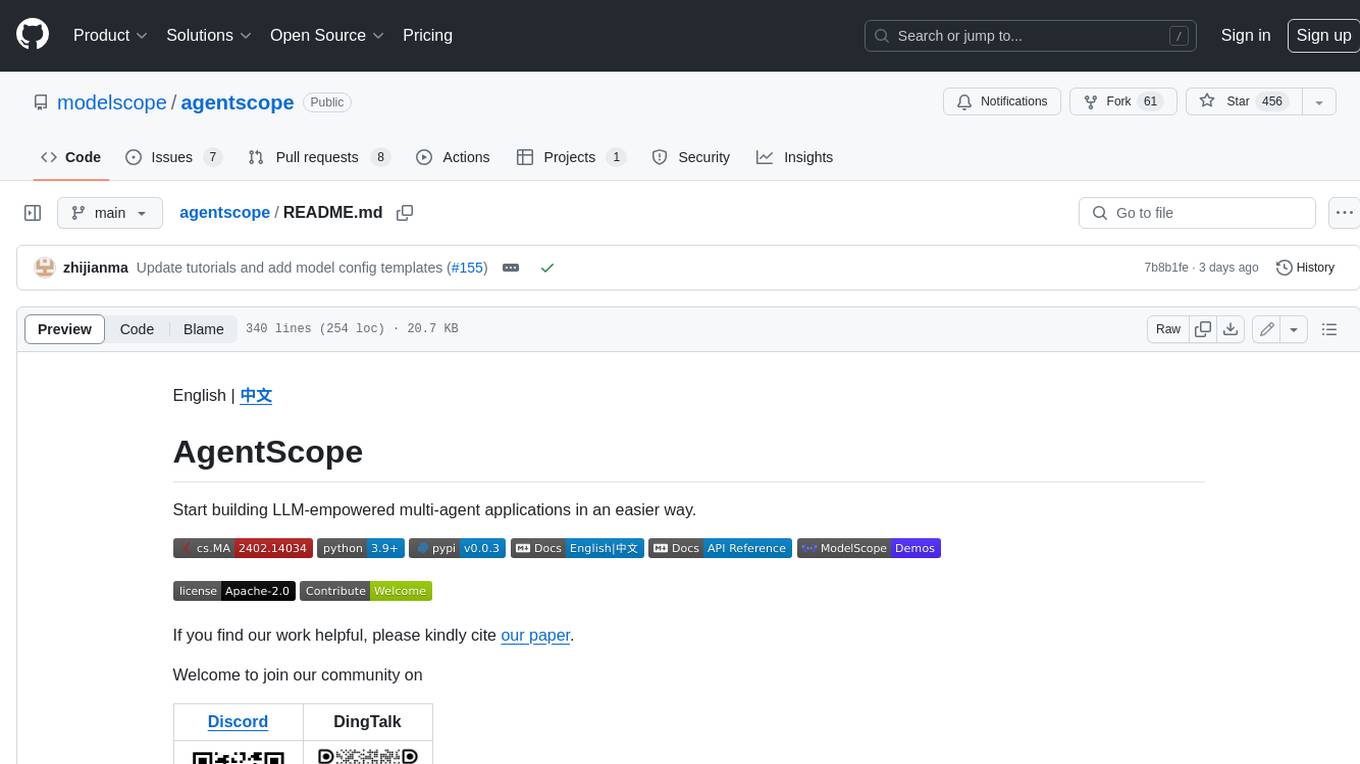
agentscope
AgentScope is a multi-agent platform designed to empower developers to build multi-agent applications with large-scale models. It features three high-level capabilities: Easy-to-Use, High Robustness, and Actor-Based Distribution. AgentScope provides a list of `ModelWrapper` to support both local model services and third-party model APIs, including OpenAI API, DashScope API, Gemini API, and ollama. It also enables developers to rapidly deploy local model services using libraries such as ollama (CPU inference), Flask + Transformers, Flask + ModelScope, FastChat, and vllm. AgentScope supports various services, including Web Search, Data Query, Retrieval, Code Execution, File Operation, and Text Processing. Example applications include Conversation, Game, and Distribution. AgentScope is released under Apache License 2.0 and welcomes contributions.
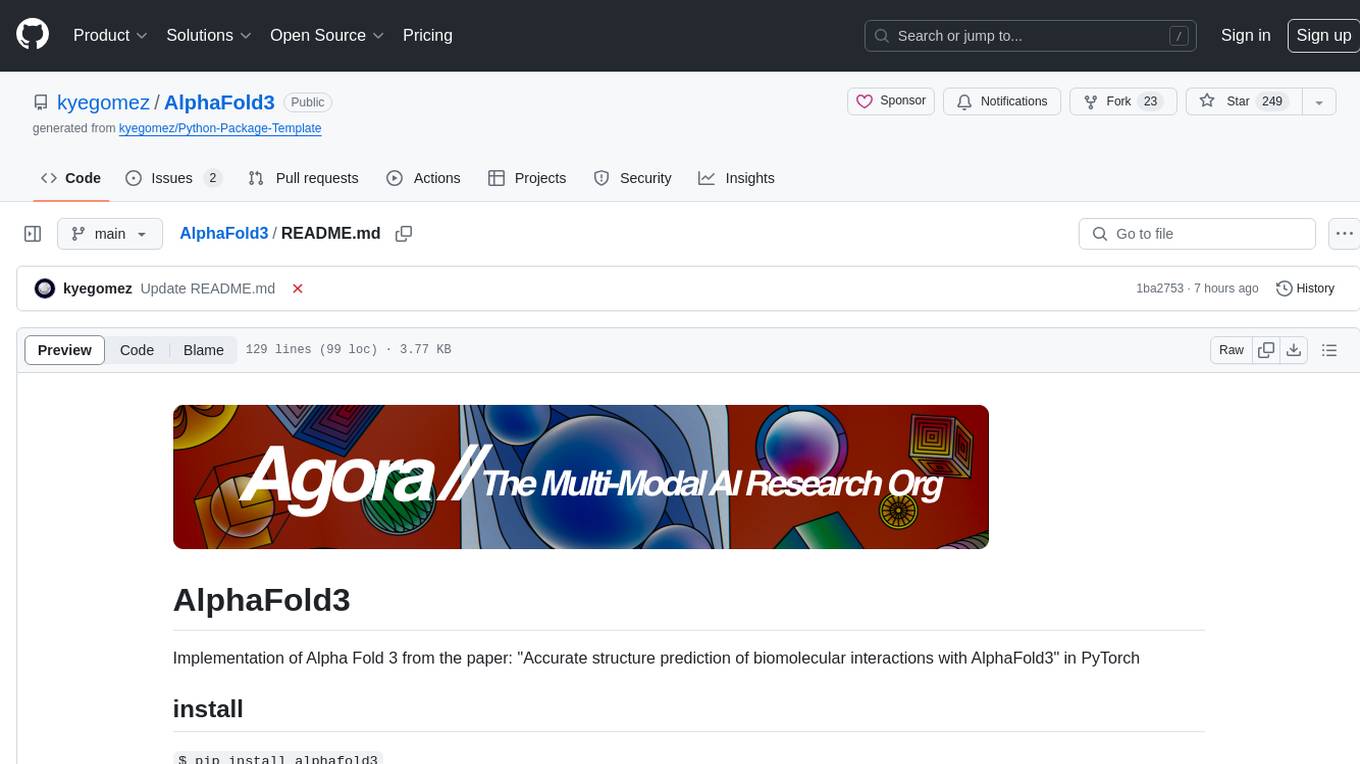
AlphaFold3
AlphaFold3 is an implementation of the Alpha Fold 3 model in PyTorch for accurate structure prediction of biomolecular interactions. It includes modules for genetic diffusion and full model examples for forward pass computations. The tool allows users to generate random pair and single representations, operate on atomic coordinates, and perform structure predictions based on input tensors. The implementation also provides functionalities for training and evaluating the model.
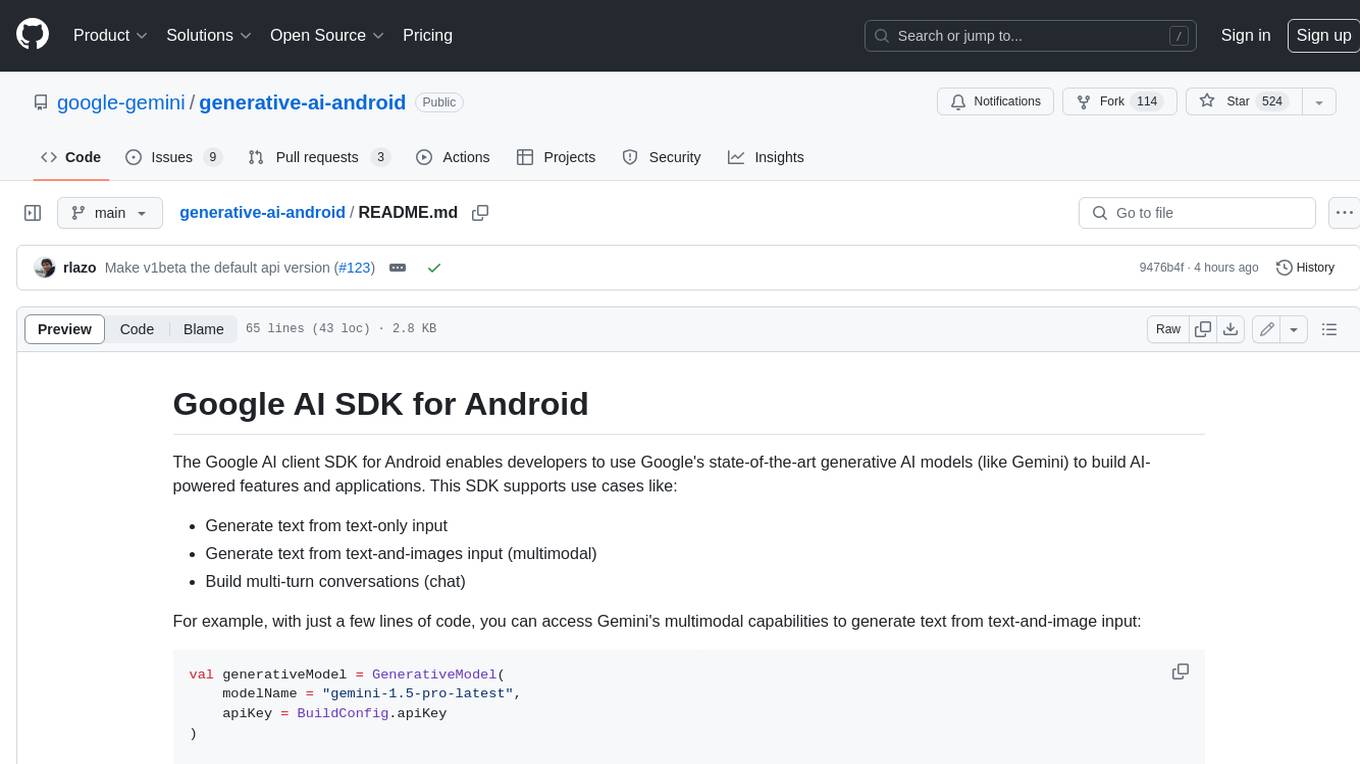
generative-ai-android
The Google AI client SDK for Android enables developers to use Google's state-of-the-art generative AI models (like Gemini) to build AI-powered features and applications. This SDK supports use cases like: - Generate text from text-only input - Generate text from text-and-images input (multimodal) - Build multi-turn conversations (chat)
2 - OpenAI Gpts
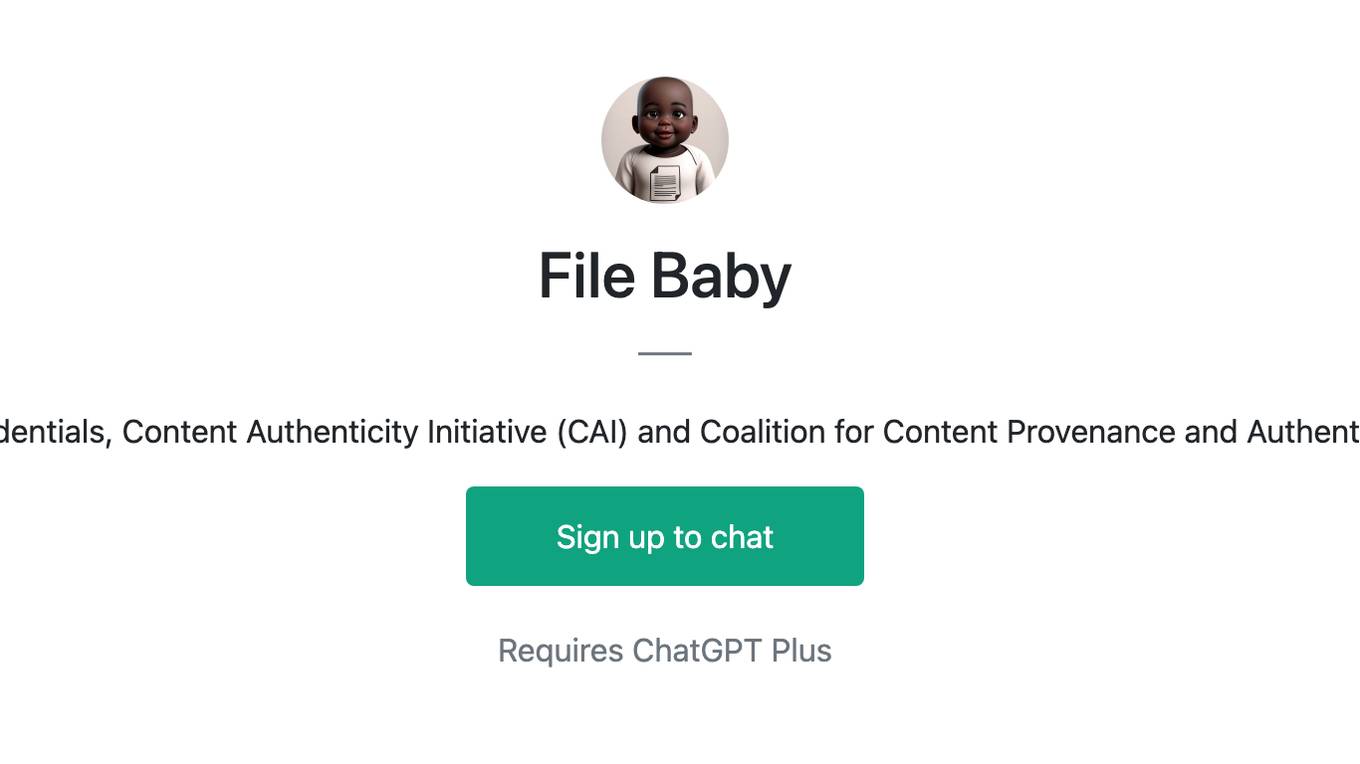
File Baby
Your guide to Content Credentials, Content Authenticity Initiative (CAI) and Coalition for Content Provenance and Authenticity (C2PA) at File.Baby.

Project Change Management Advisor
Guides organizational transitions to achieve desired business outcomes.